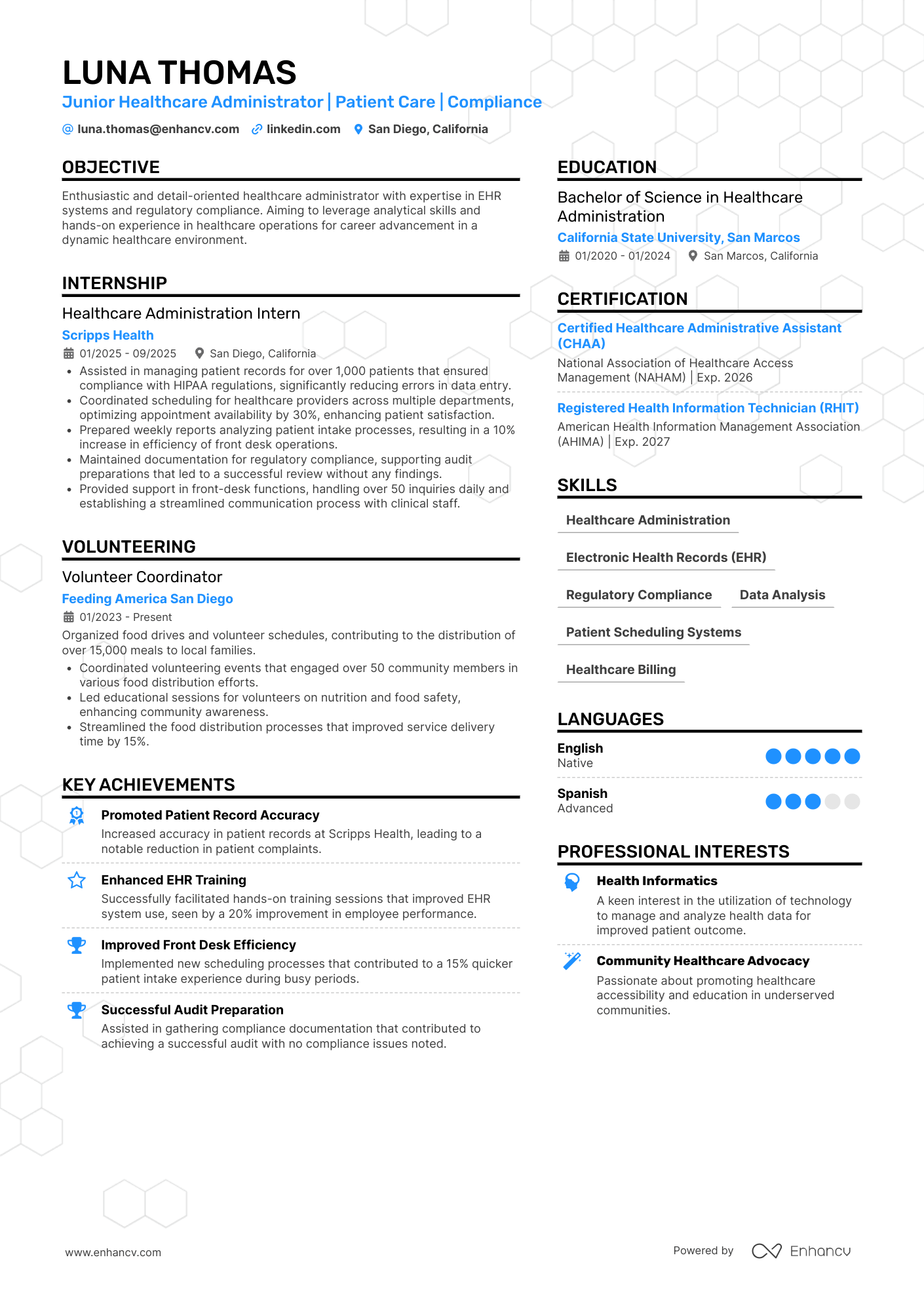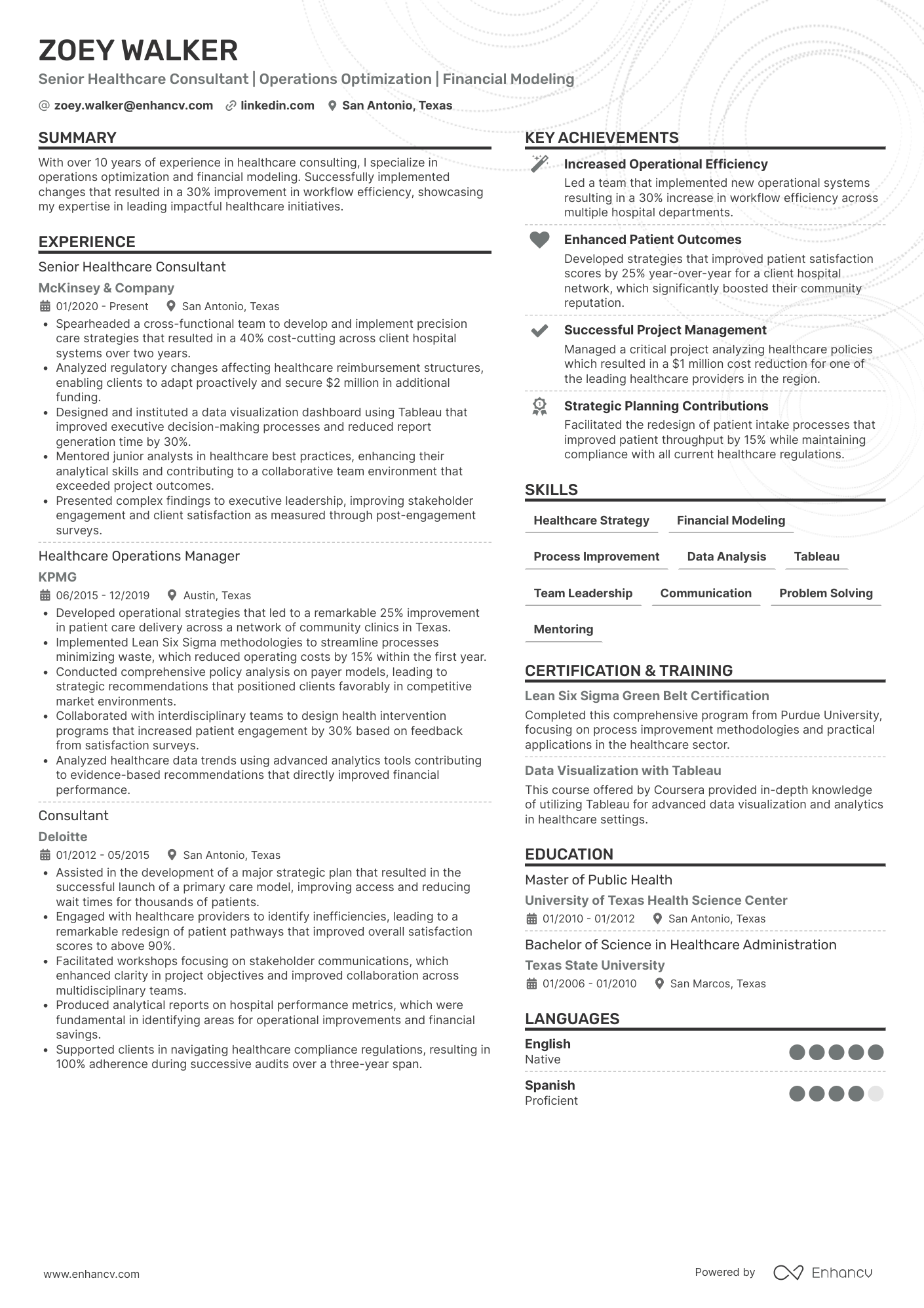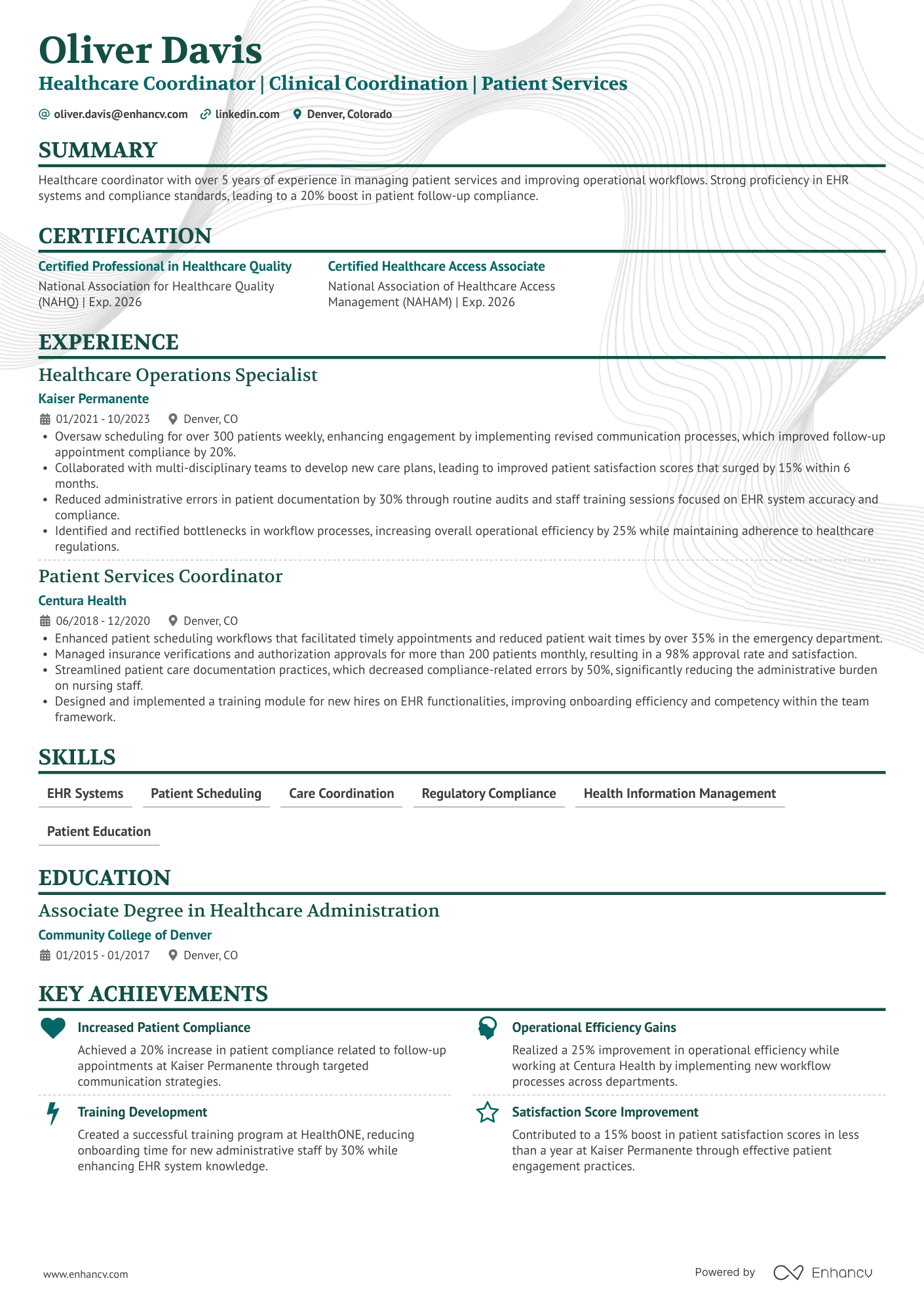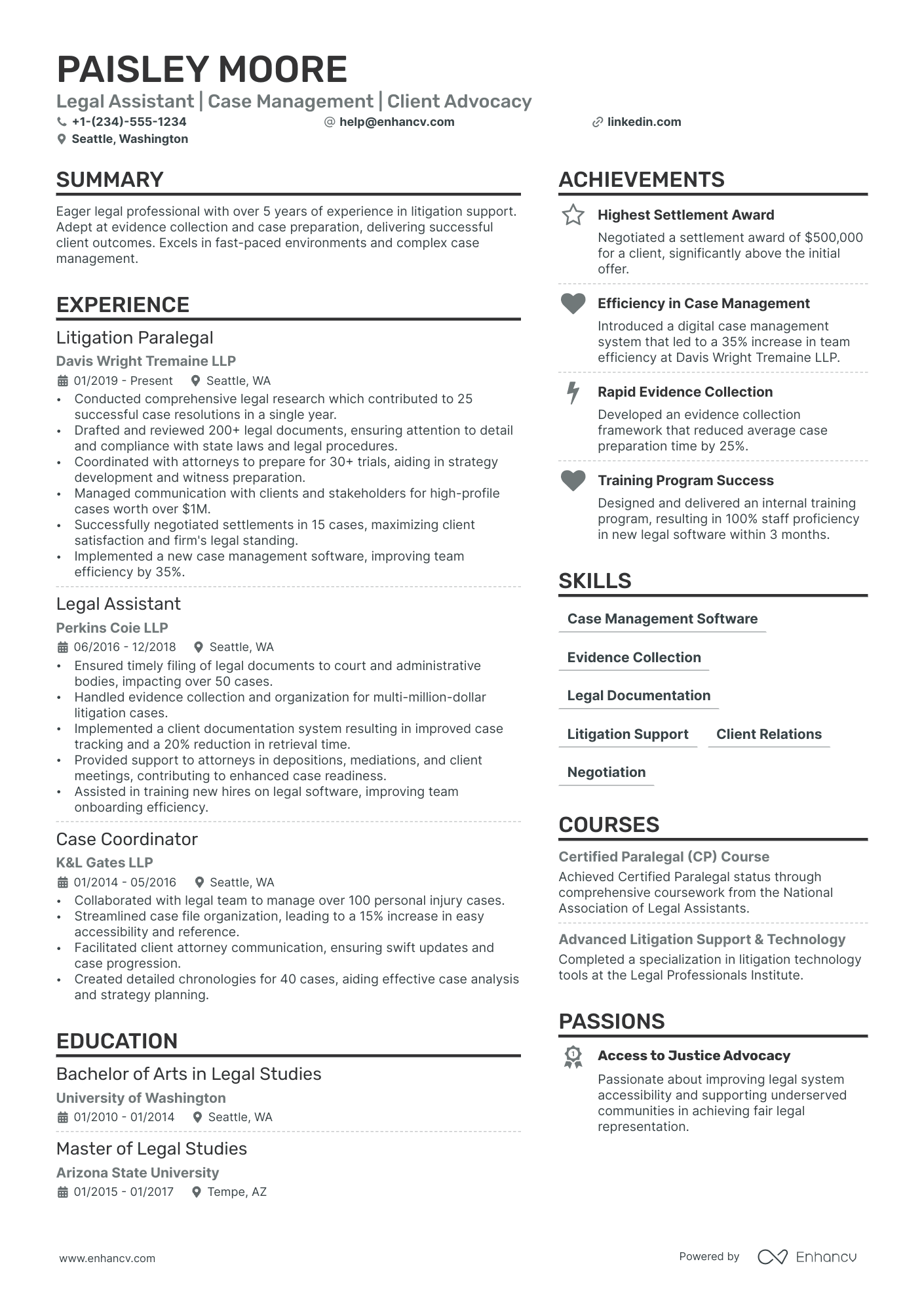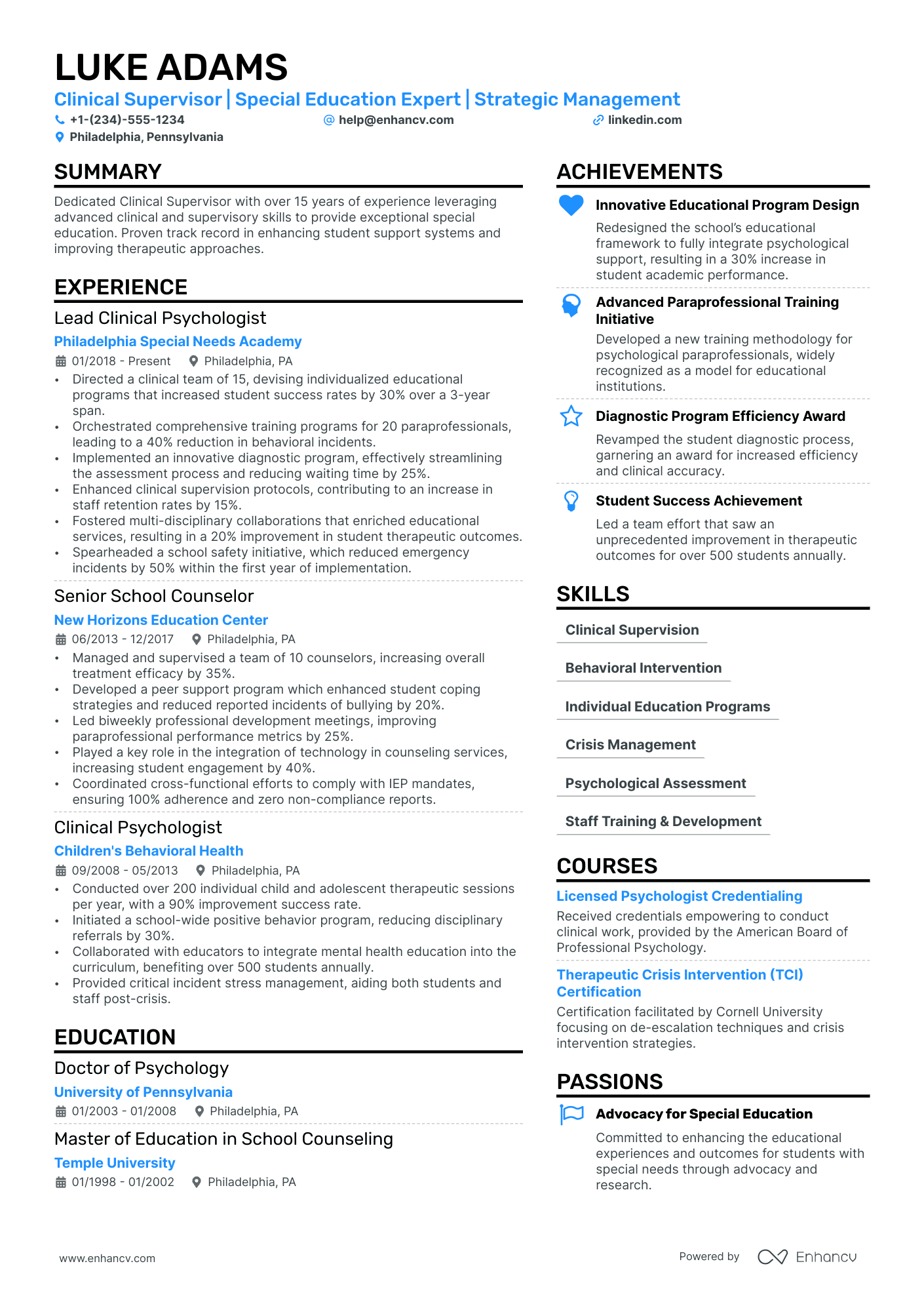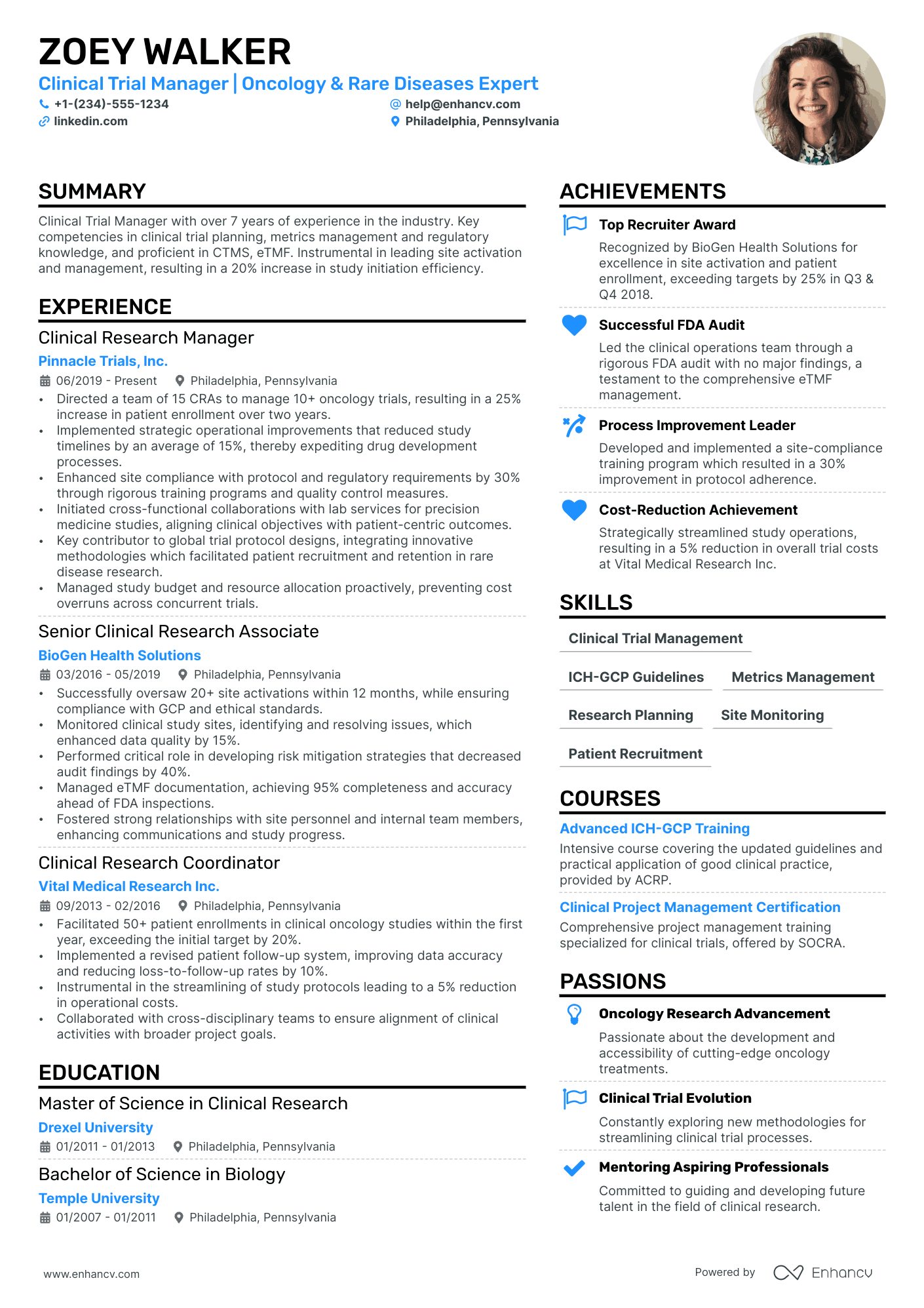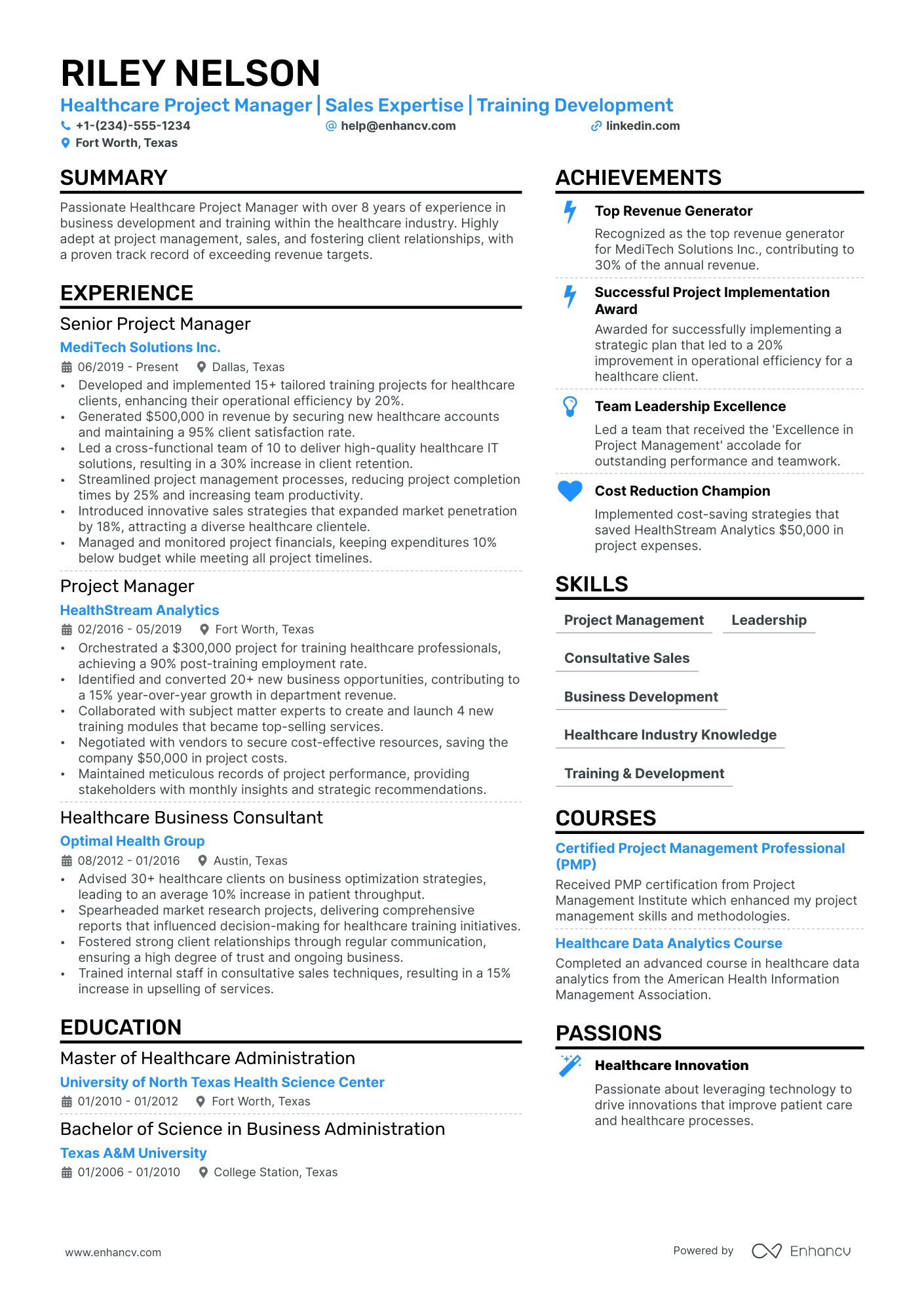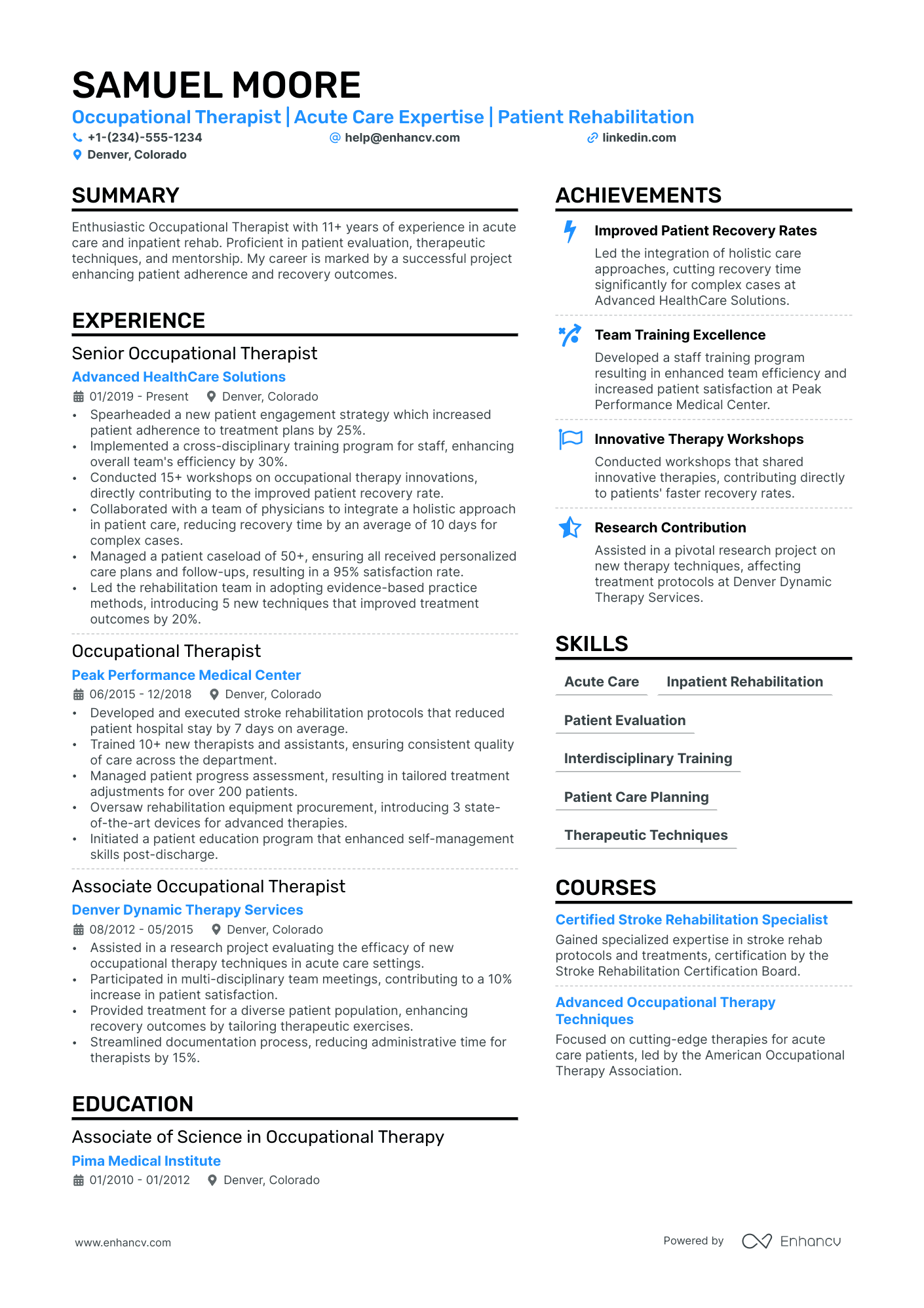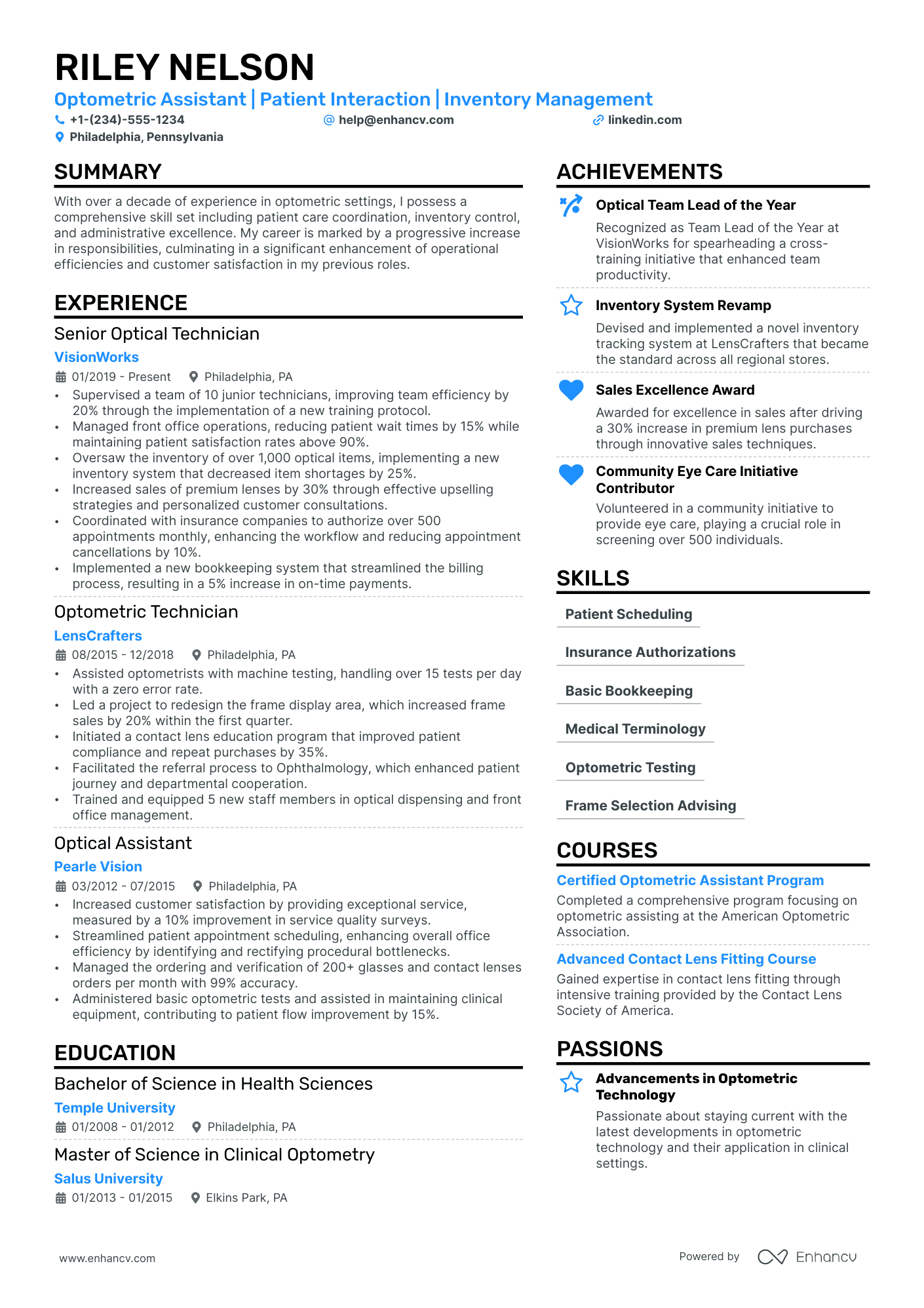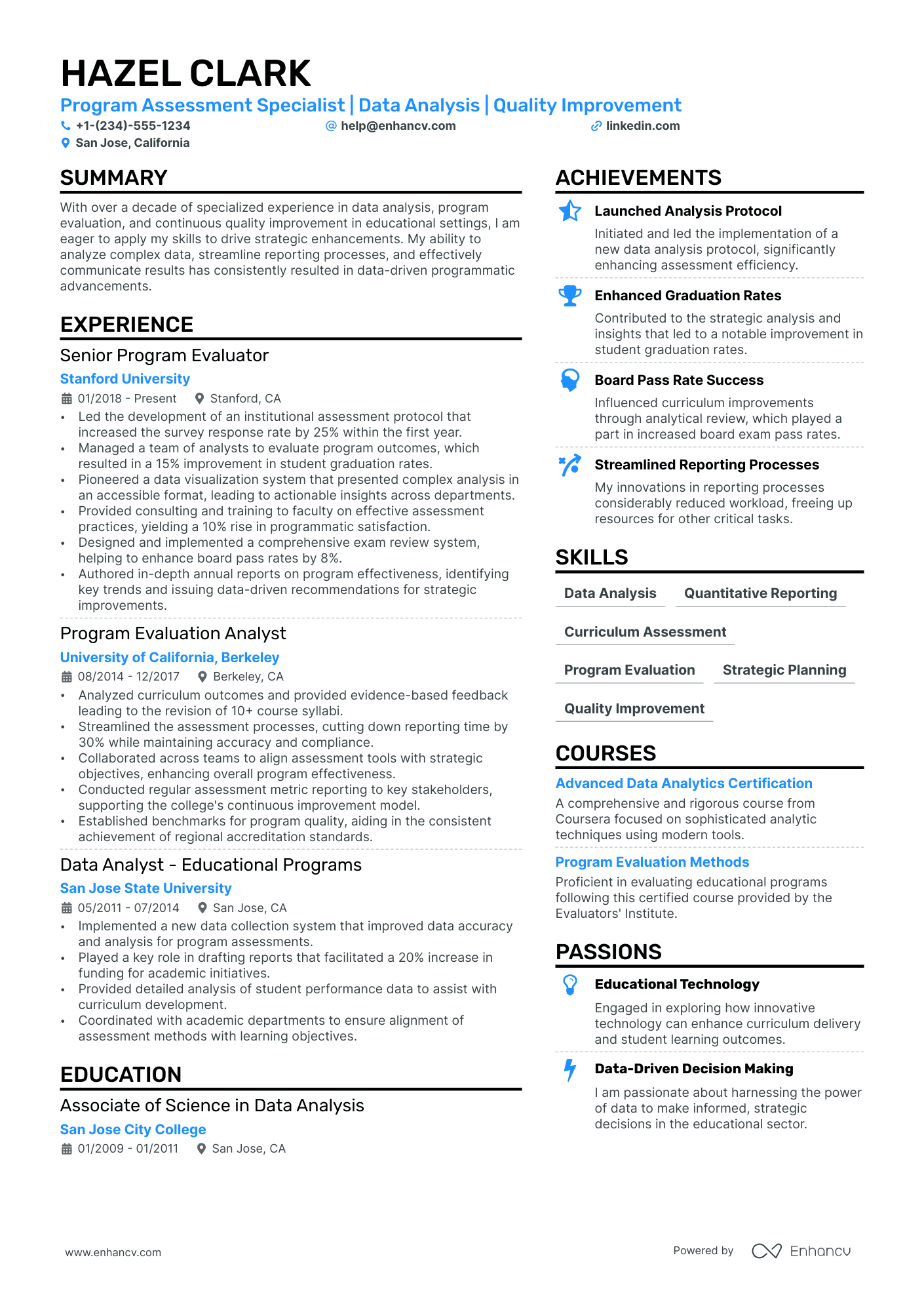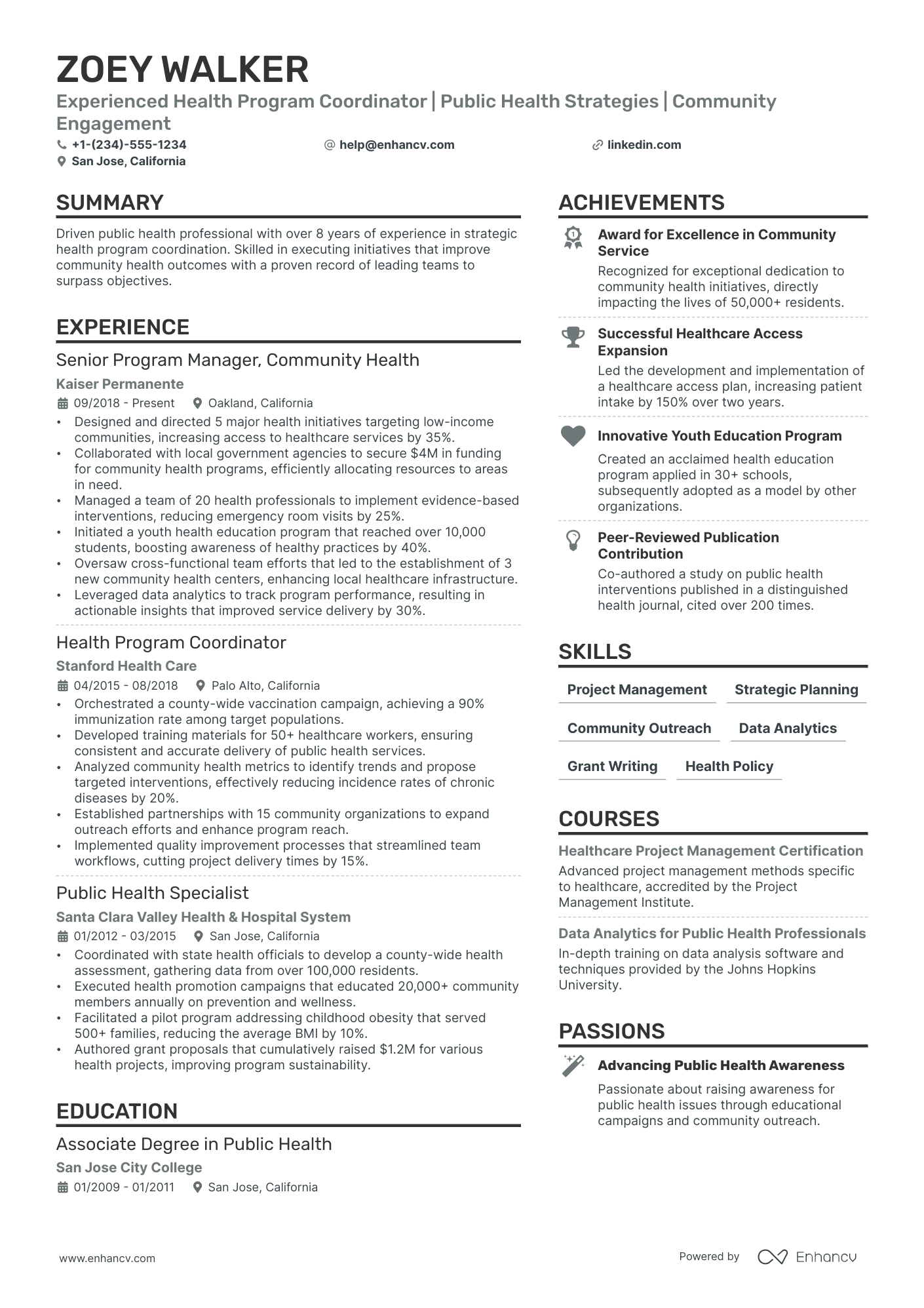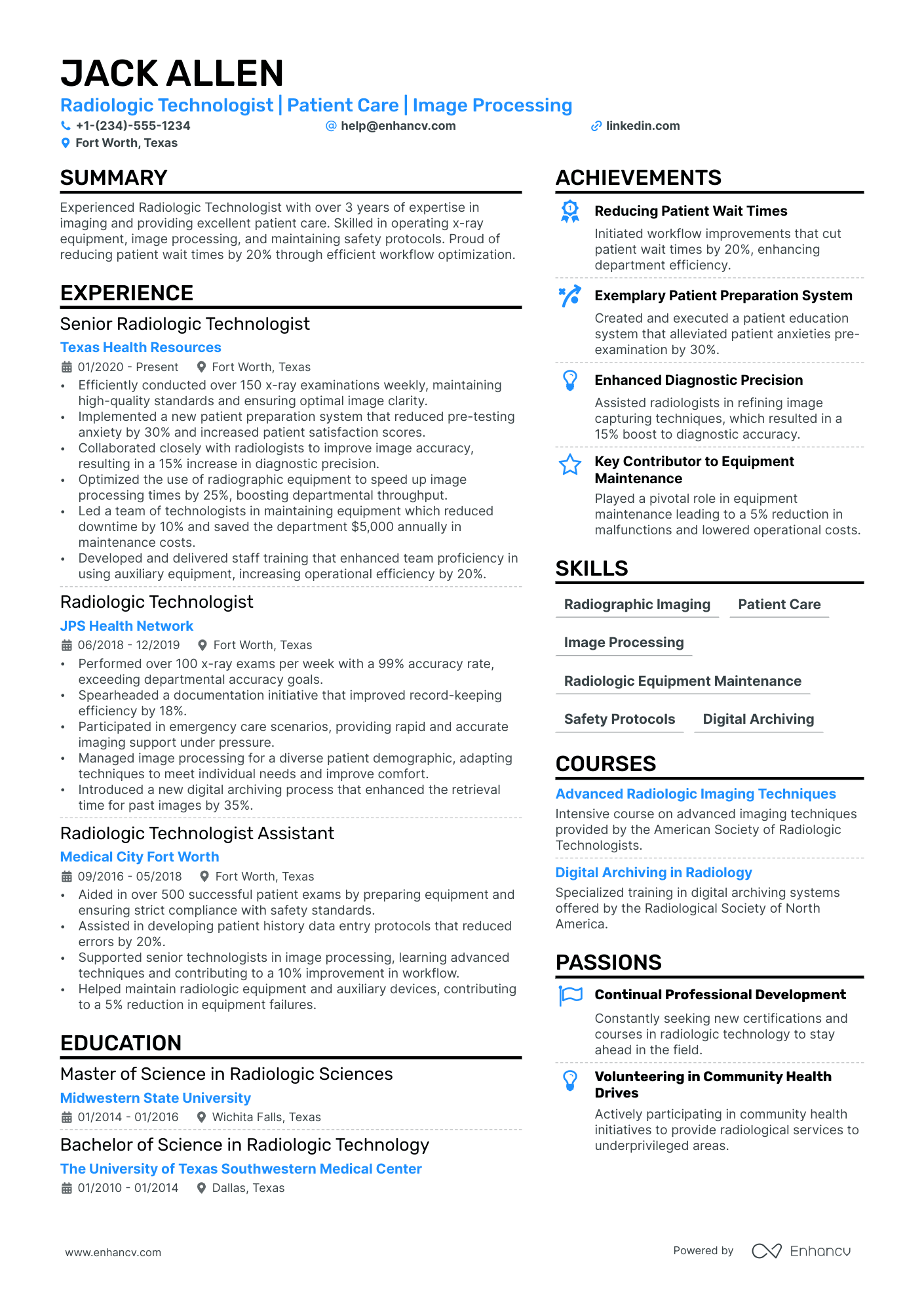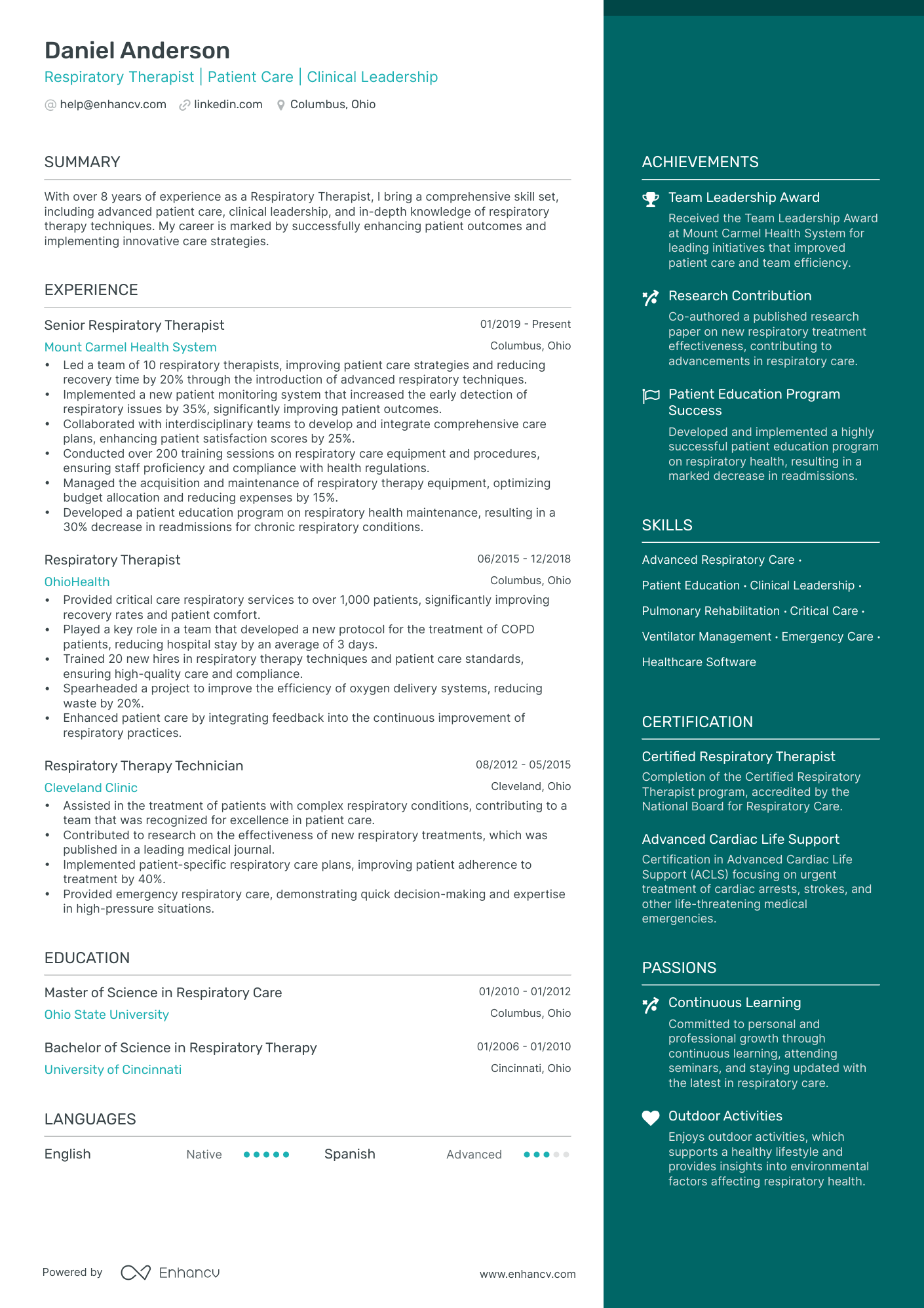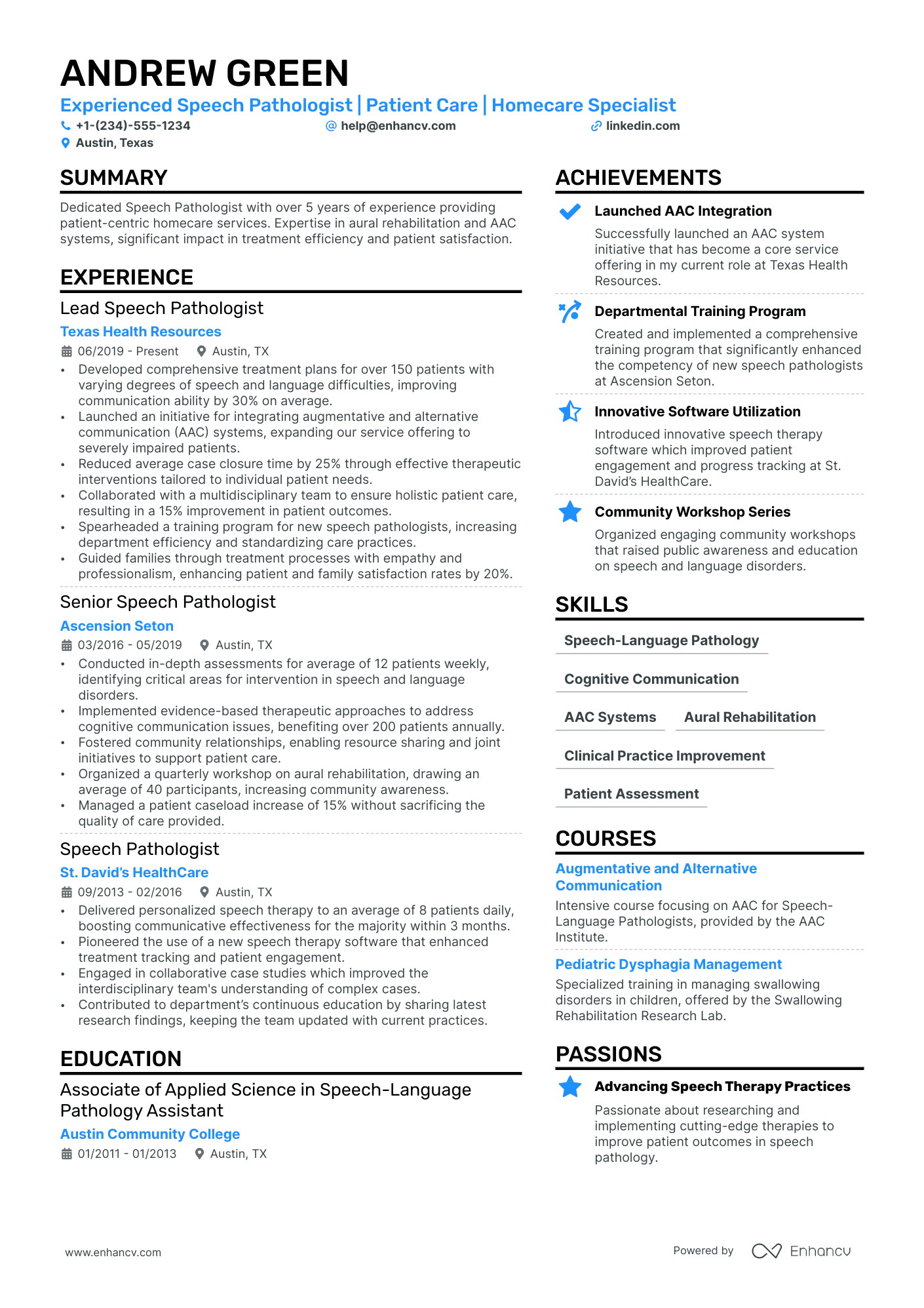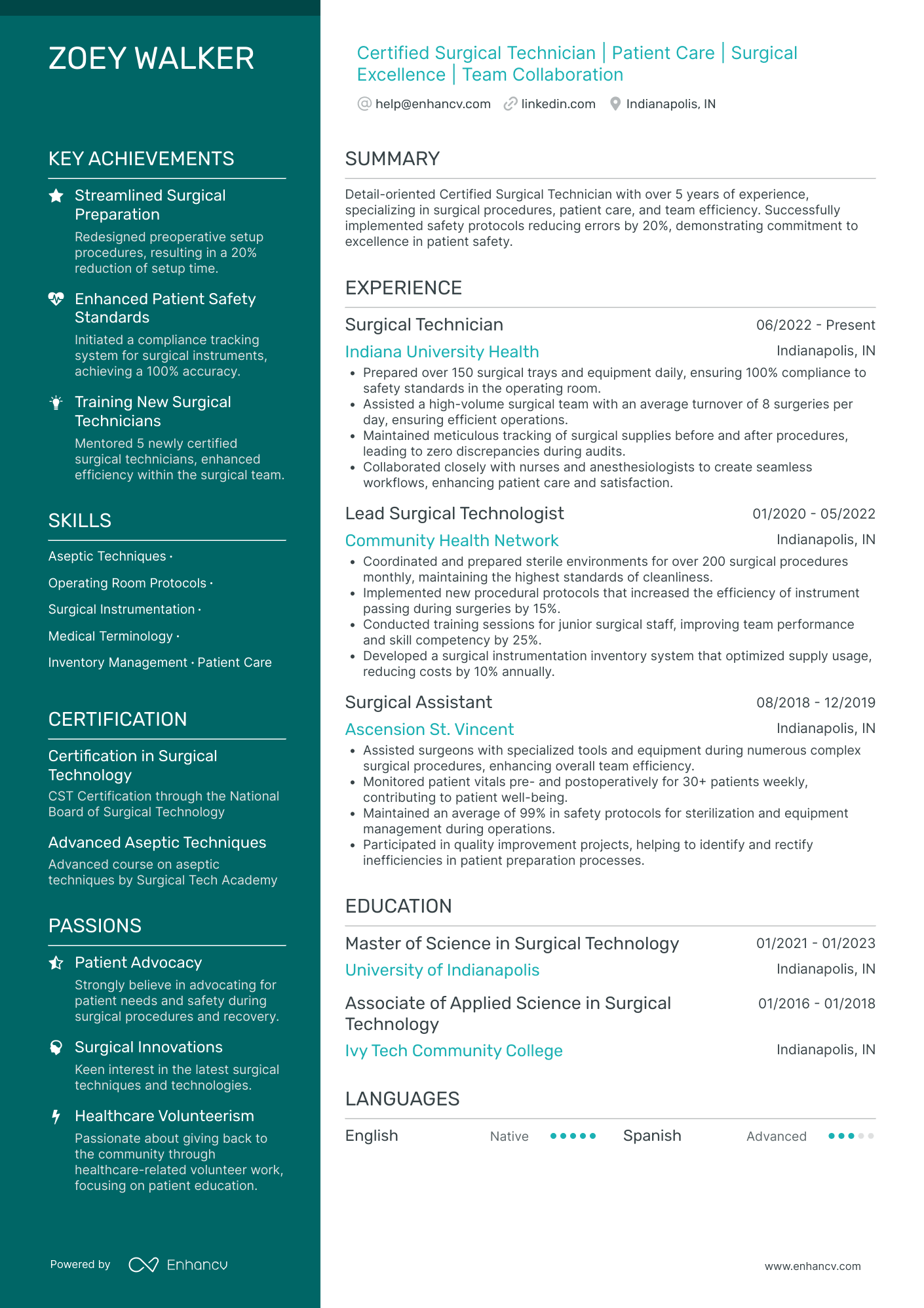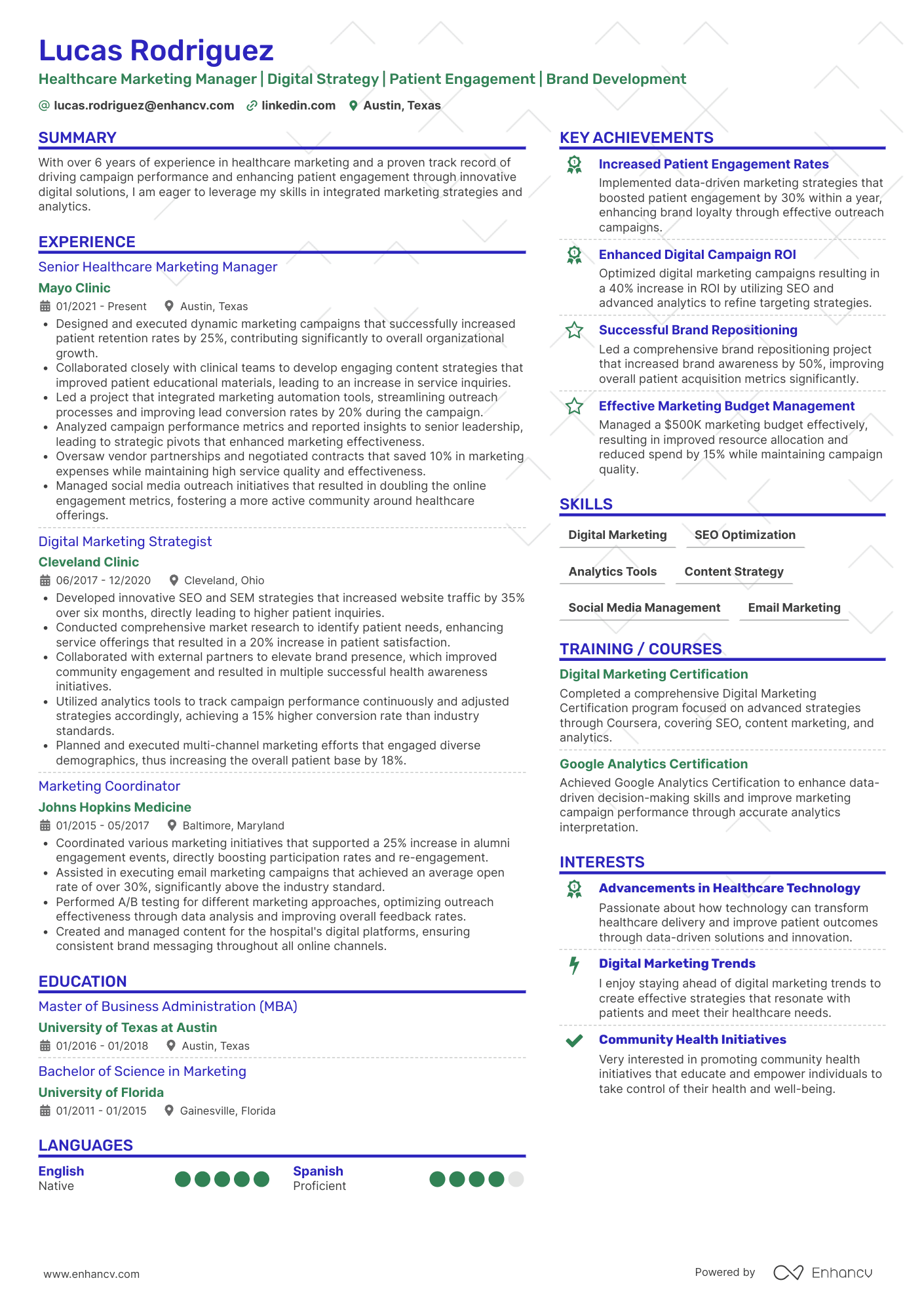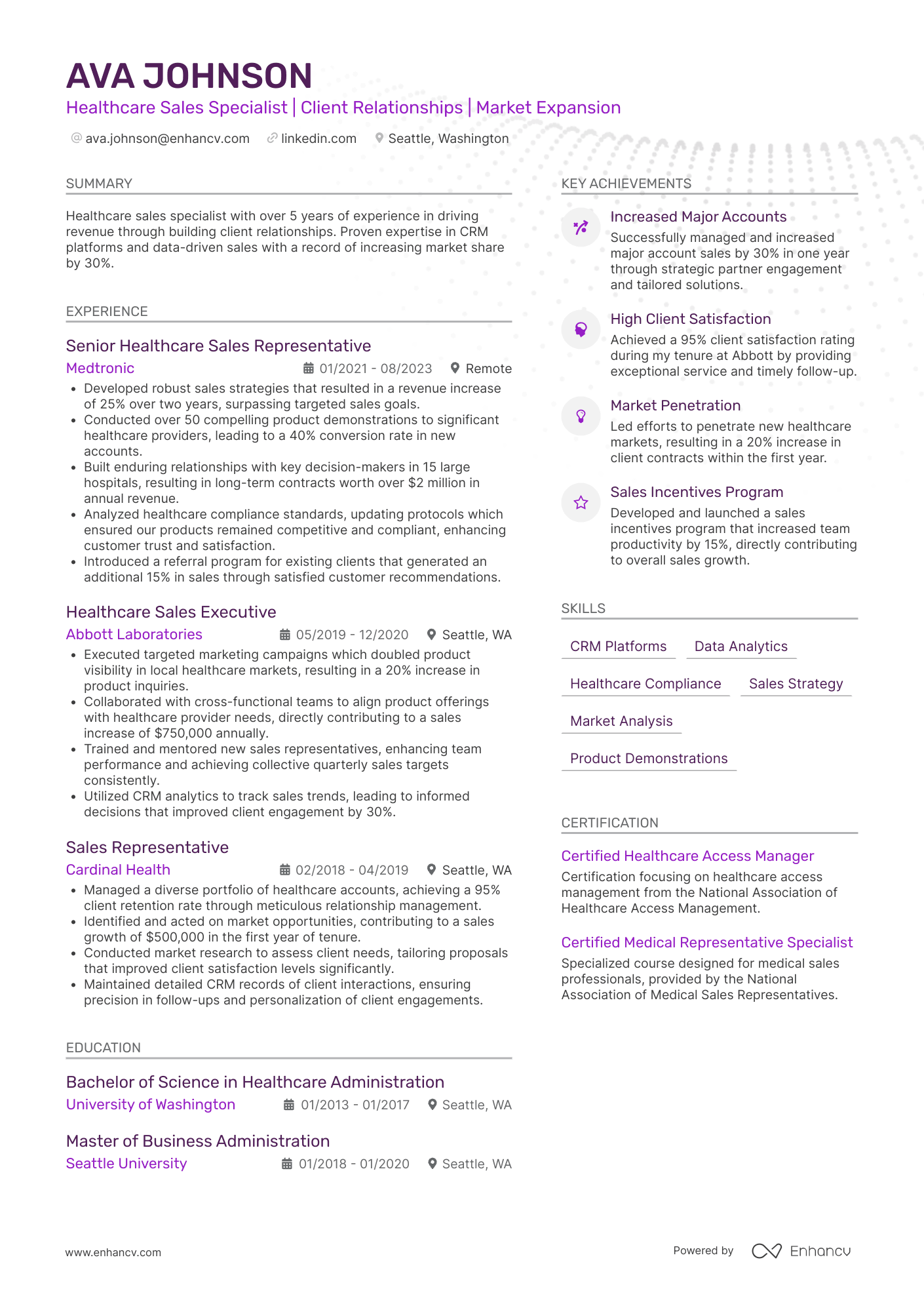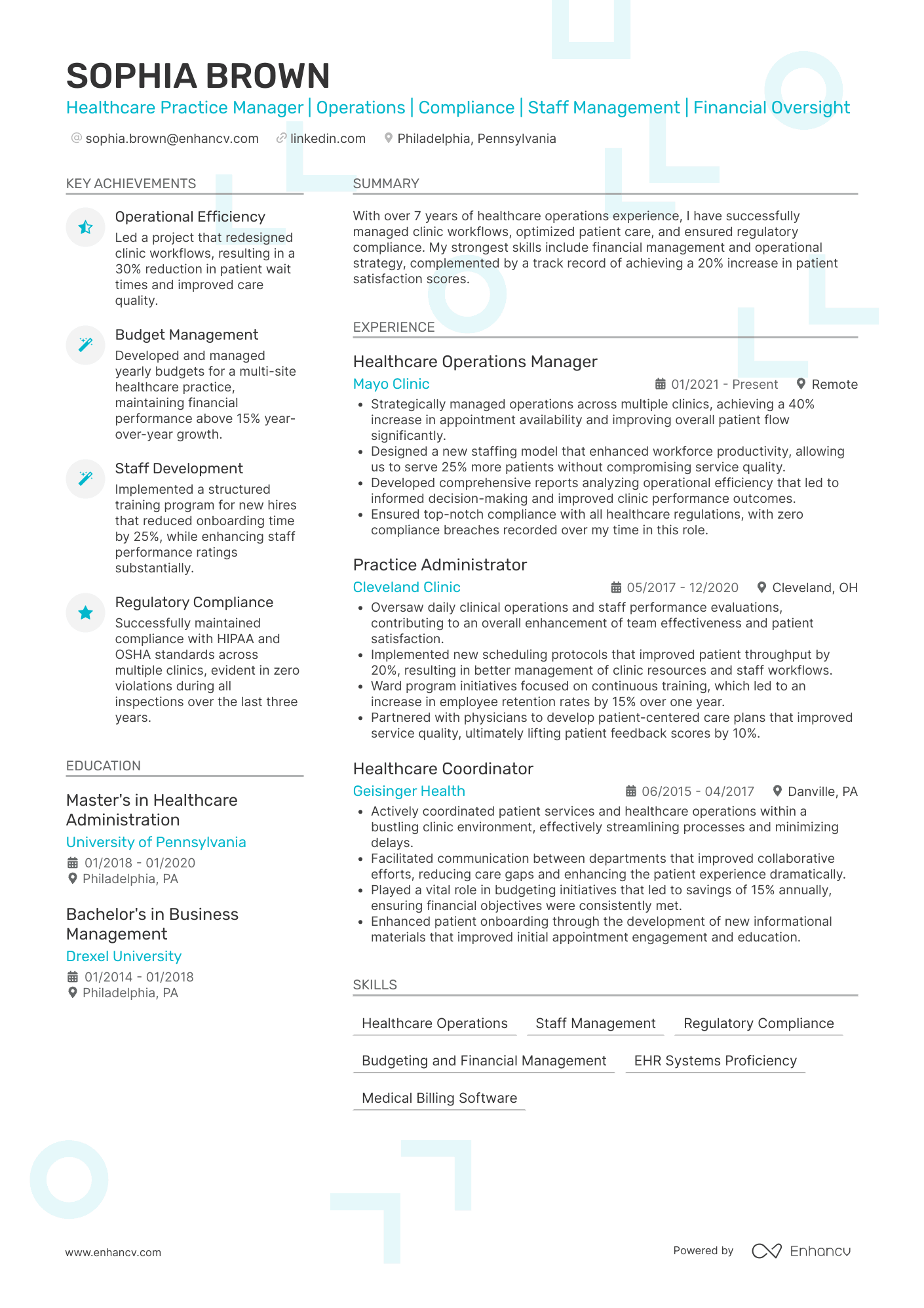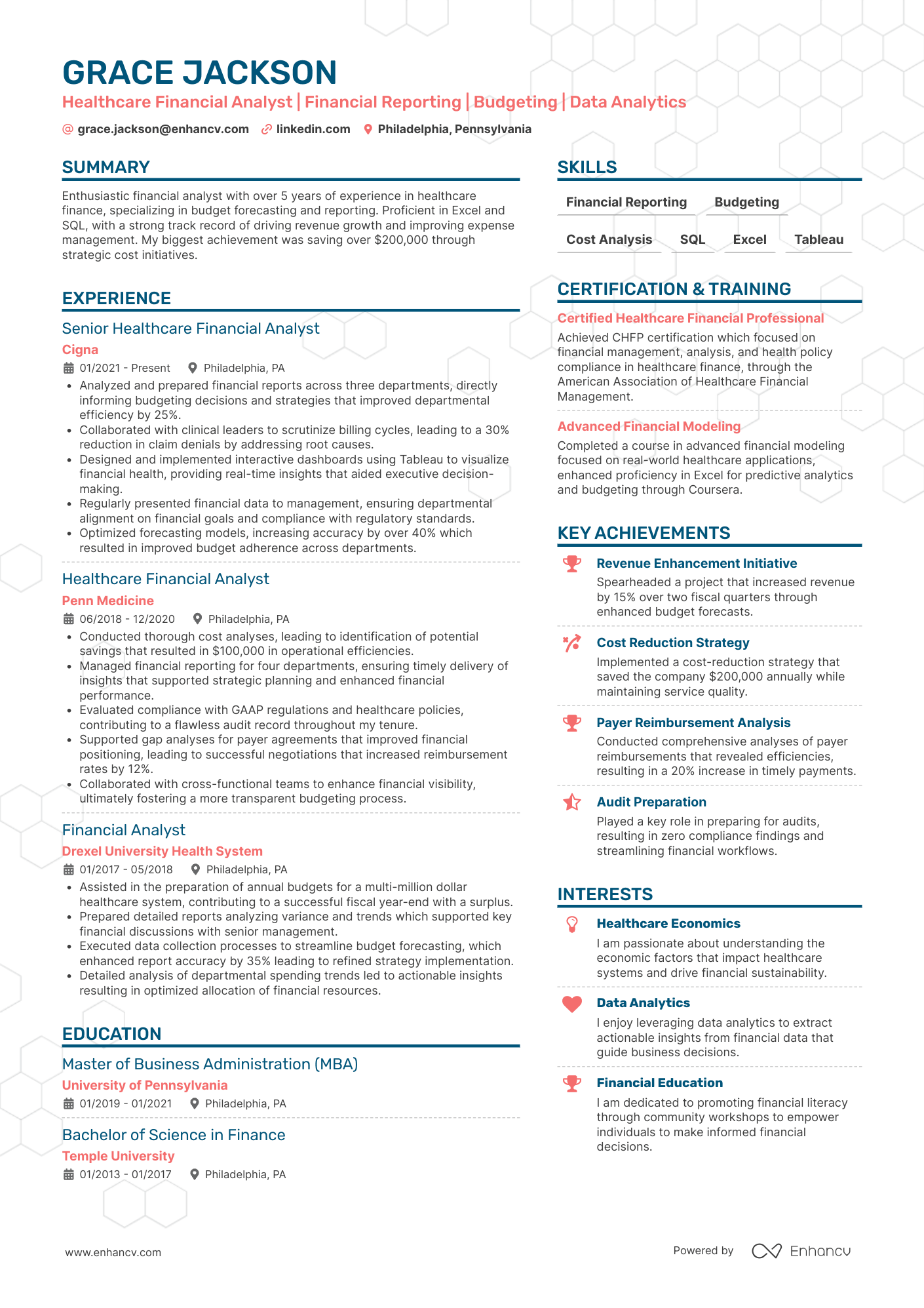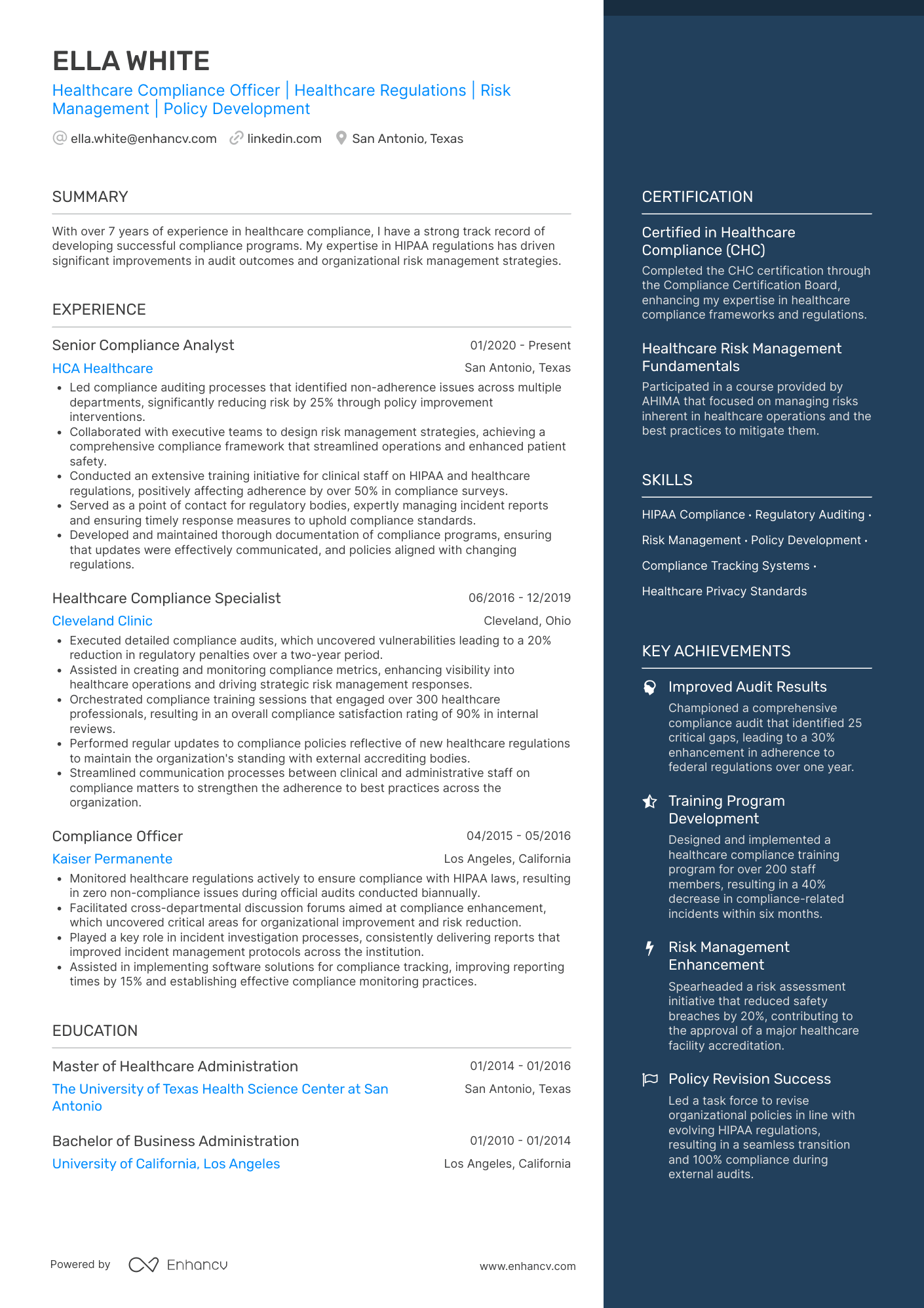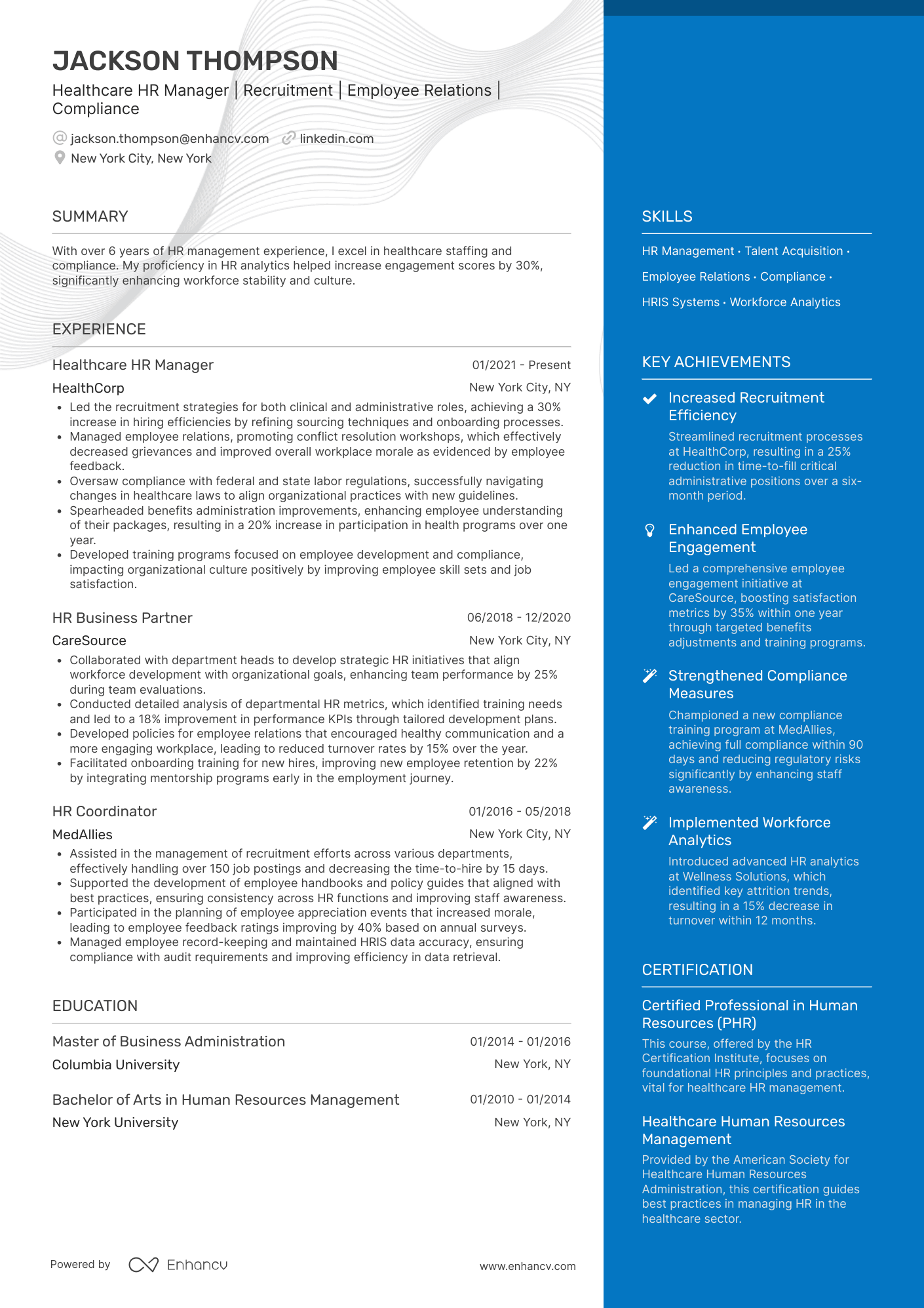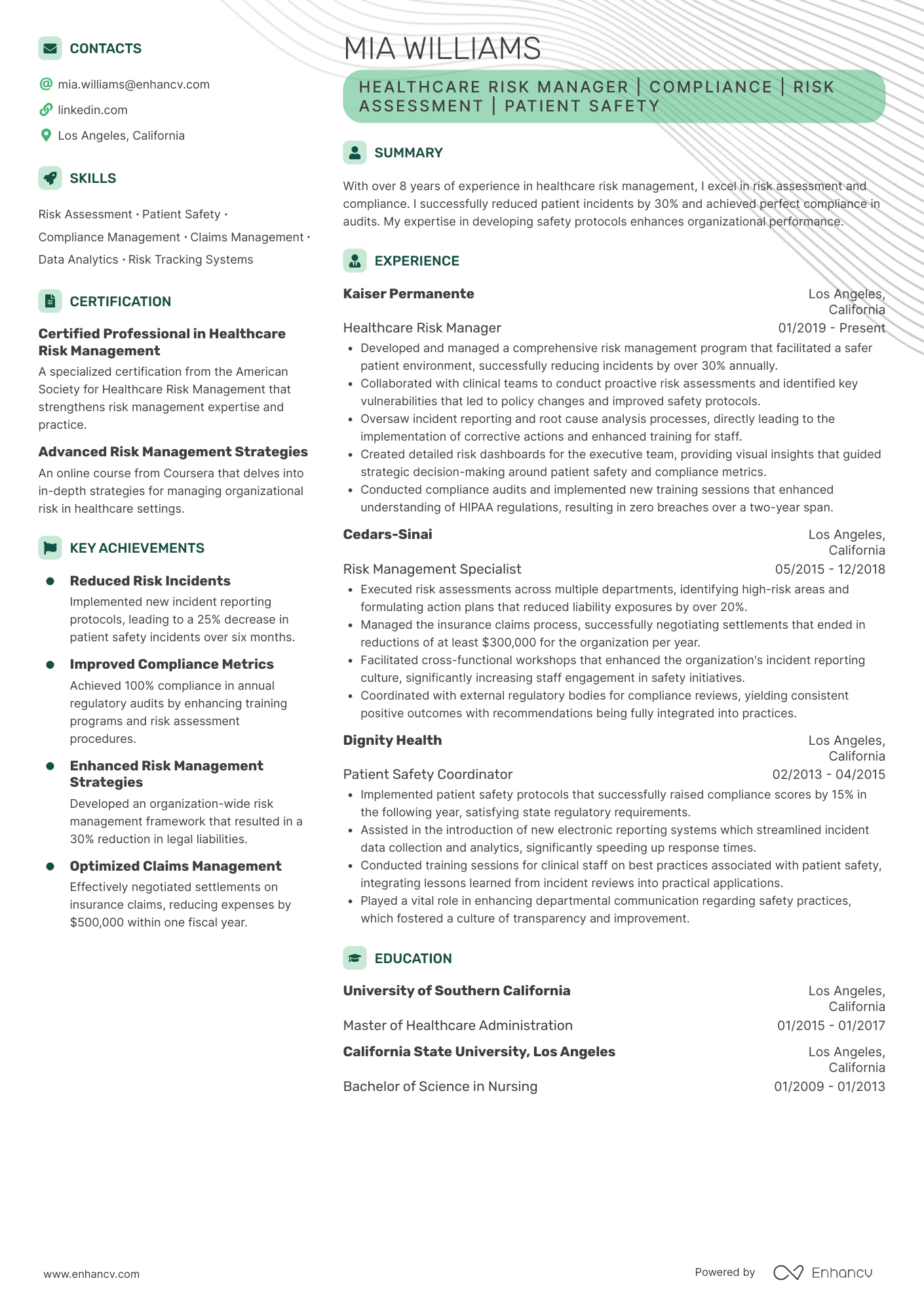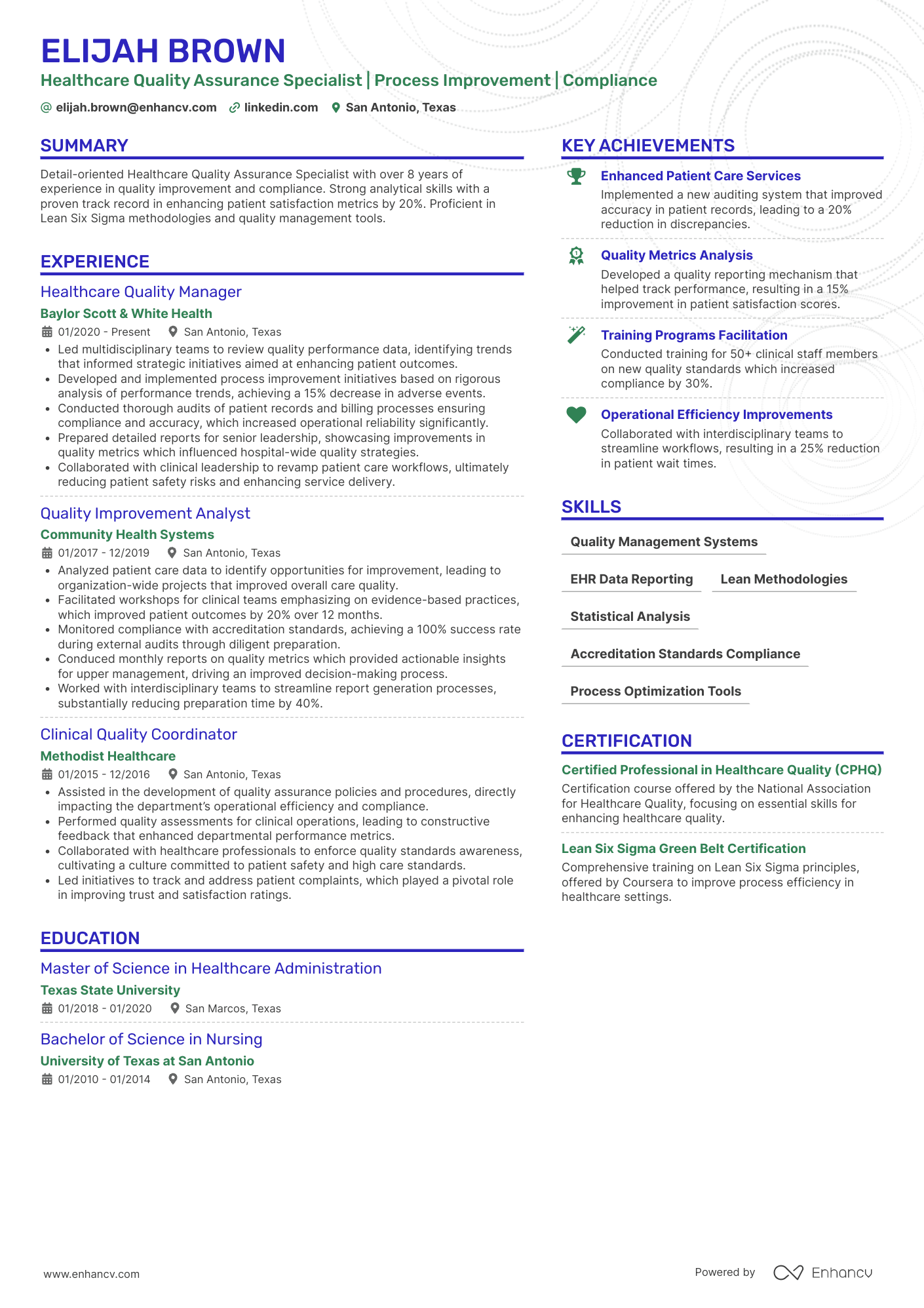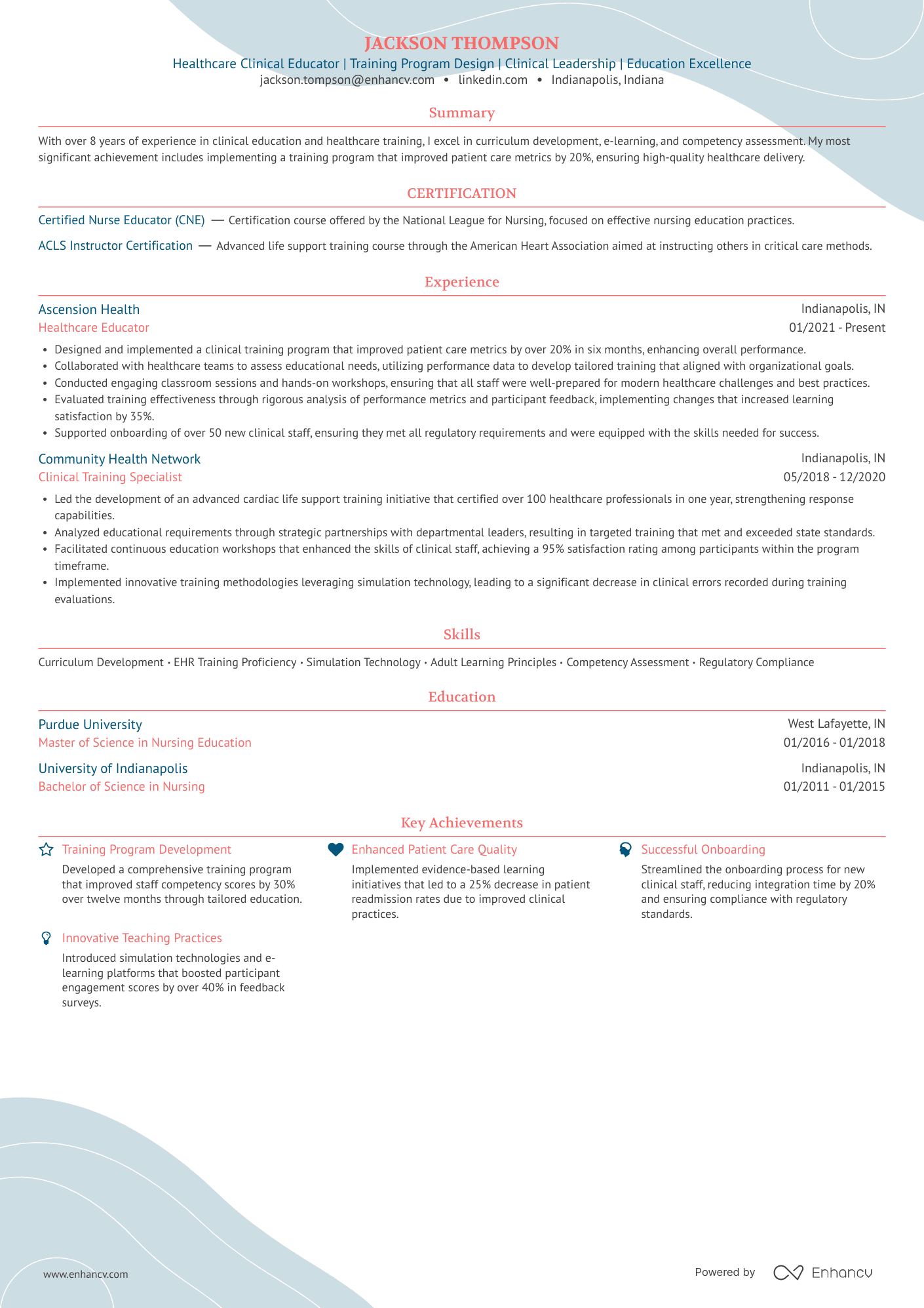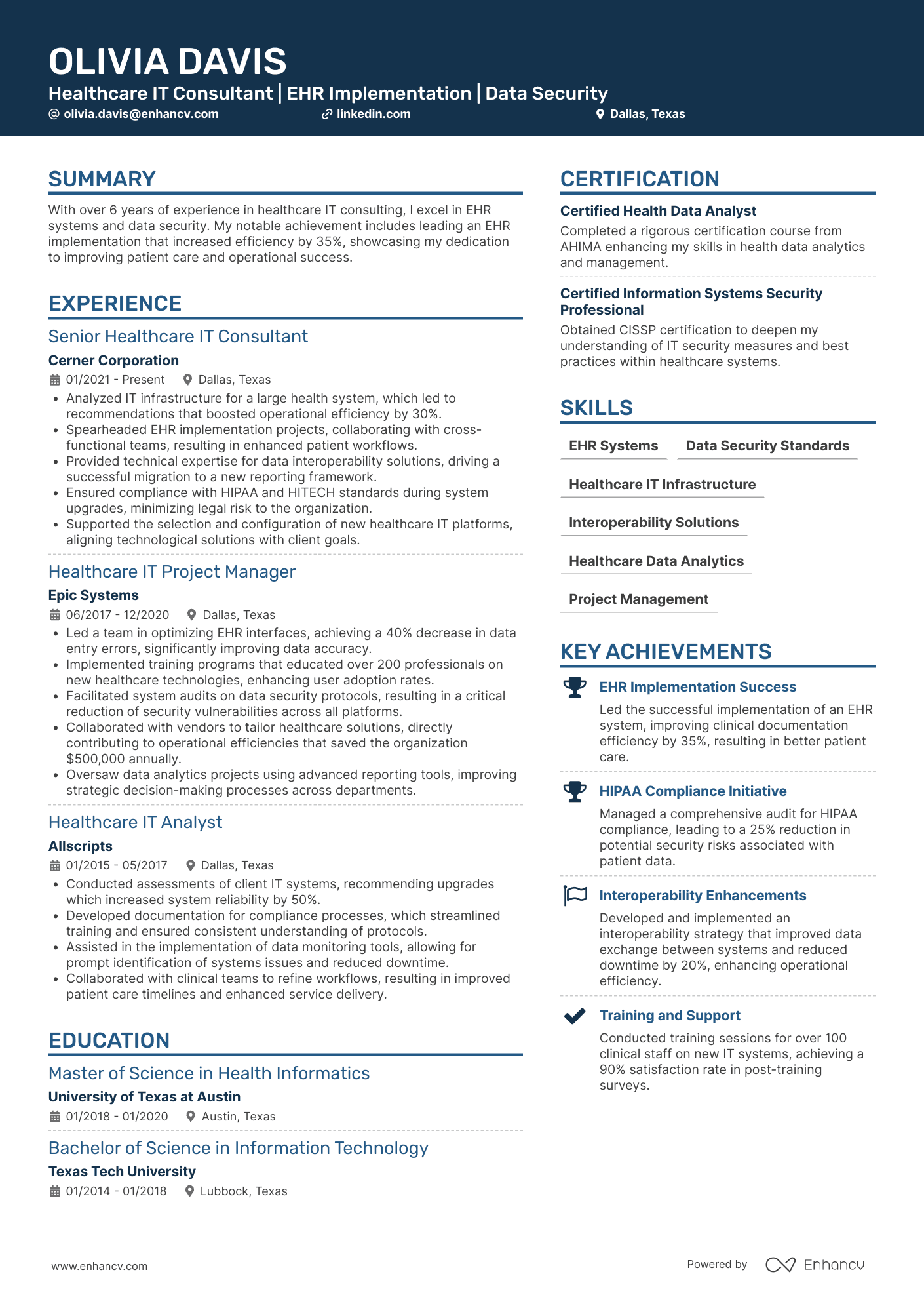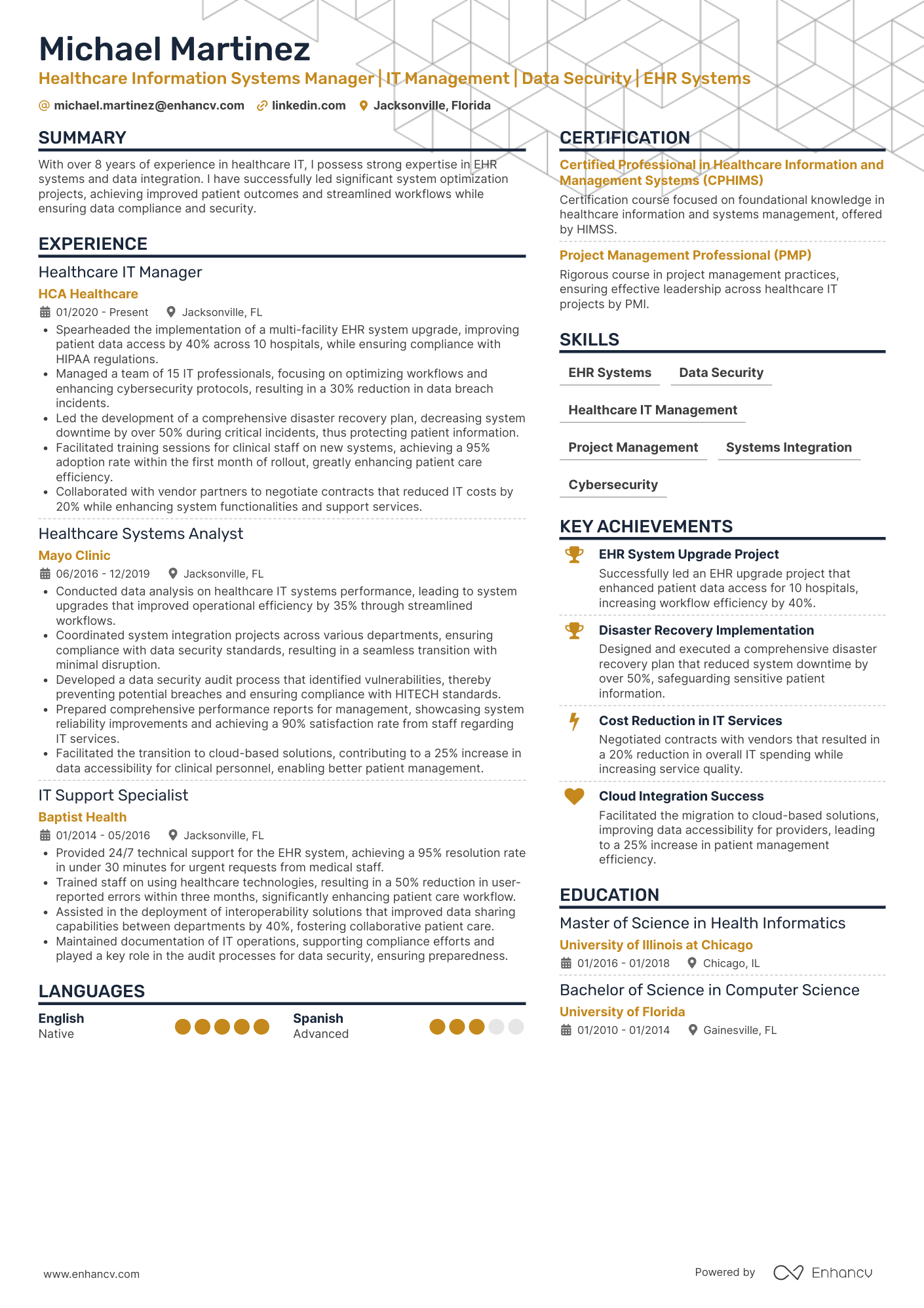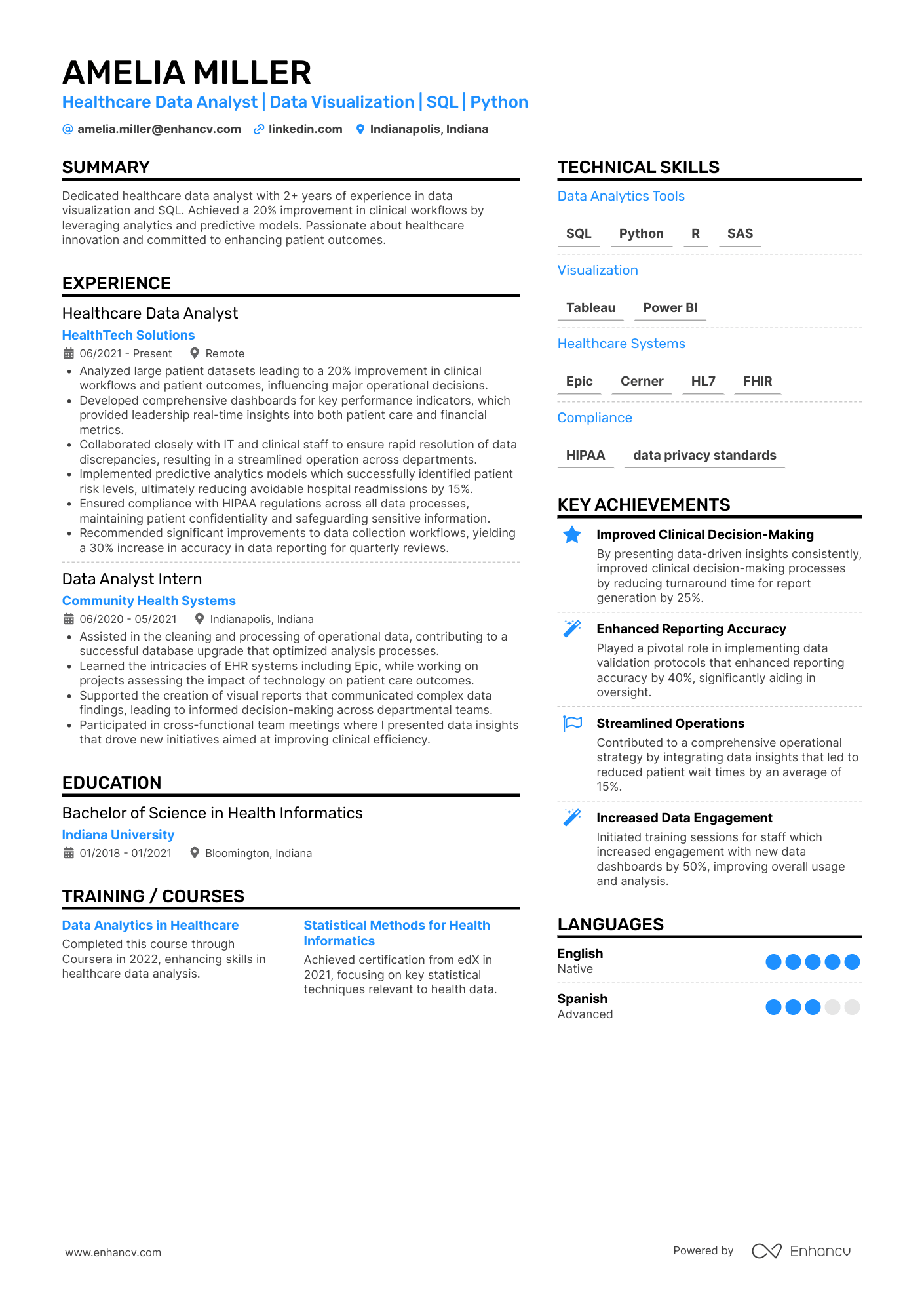Writing a good healthcare resume is all about showing competence and impact. What are your qualifications? Did you improve patient outcomes? Have you streamlined any care processes? How did you support organizational goals?
It doesn’t matter if you’re applying to a public sector hospital, a private clinic, or an exciting telemedicine startup. This guide will help you craft an application that goes past applicant tracking systems (ATS) with ease and makes hiring managers want to talk to you.
Healthcare resume examples
By Experience
Entry-Level Healthcare Administrator
- For entry-level healthcare administrators, a double-column resume works well because recruiters need to quickly evaluate your education, certifications, and foundational skills when professional experience is limited.
- Hiring managers value candidates who show familiarity with EHR systems like Epic or Cerner, even at the entry level, since technology adoption is a big part of administrative workflows.
- The emphasis for this role should be on your readiness to take on administrative responsibilities and willingness to grow in a healthcare setting. In your objective, highlight your passion for healthcare operations and your ability to support patient-focused services.
- As shown in this example, use the main column to outline relevant experience from internships and volunteering. Dedicate the second column to your education, certification, and hard skills. In the skills section, list administrative tools, EHR familiarity, and scheduling systems.
Senior Healthcare Consultant
- Senior healthcare consultants benefit from a double-column resume. It works well when you need to display strategic achievements and technical expertise.
- Showing multi-state regulatory knowledge and experience working with both payers and providers can set you apart, as healthcare consulting increasingly spans integrated systems.
- Use the main column to outline your experience. Detail your leadership in driving operational improvements, cost reductions, and quality-of-care initiatives. Since recruiters for senior-level roles focus heavily on business impact, include a key achievements section near the top to highlight measurable successes, such as revenue growth, improved patient satisfaction, or workflow efficiency.
Mid-Level Healthcare Coordinator
- The most important emphasis for this role is your ability to manage complex care pathways and improve operational efficiency.
- Employers often look for candidates who can navigate insurance authorization processes effectively since care coordination depends heavily on clearing approvals quickly.
- In your summary, include your years of experience, expertise in coordinating care plans, and familiarity with clinical and administrative processes. List your certifications right after the summary since they’re often required.
- The experience section should take center stage, detailing your contributions to improved patient scheduling, optimizing resource allocation, and supporting interdisciplinary teams. Include a skills section listing patient communication, EHR management, and workflow optimization, with education at the bottom.
By Role
Case Manager
- For case managers, recruiters prioritize patient outcomes, coordination experience, and certifications. Therefore, the focus for this role should be on your ability to achieve measurable patient care improvements.
- Familiarity with community health resources and social support systems gives you an edge, as effective case management often extends beyond clinical care.
- Start with a summary, mention your experience managing patient care plans, collaborating with providers, and supporting clients through healthcare systems. Place your certifications — such as CCM, ACM, or RN-based credentials — right after your summary since many employers require them.
- Follow with an experience section that shows your ability to coordinate multidisciplinary care, connect patients to resources, and improve treatment adherence. Include a skills section with relevant abilities like case management software proficiency, patient advocacy, and crisis intervention techniques, finishing with your education.
Clinical Director
- The focus for such a high-profile role should be on your ability to lead clinical teams and deliver organizational improvements.
- Experience in value-based care models can help you impress hiring decision-makers, as many organizations now tie leadership metrics directly to patient outcomes and cost efficiency.
- In your experience section, highlight metrics such as managing budgets, reducing patient wait times, or increasing quality compliance scores. Use your skills section to showcase expertise in leadership, quality assurance, and regulatory compliance.
- By positioning key achievements at the top, you immediately show the value you bring as a strategic leader, while placing certifications high ensures recruiters can quickly verify your clinical and administrative credibility.
Clinical Trial Manager
- For clinical trial managers, a double-column resume works well because employers want to see a balance of research experience, regulatory knowledge, and technical expertise.
- Including your understanding of ICH-GCP compliance and experience with electronic data capture systems will make your resume notable in highly regulated research environments.
- In the main column, list your work history in reverse-chronological order. Detail your roles in leading trials, coordinating teams, and ensuring accurate reporting. Include quantifiable contributions like enrolling participants, improving adherence to study protocols, or reducing data discrepancies.
- Feature a key achievements section near the top for successes like completing studies ahead of schedule or improving participant retention. In a dedicated skills section, include protocol development, FDA and GCP compliance, data collection tools, and project management software.
Healthcare Project Manager
- For healthcare project managers, a double-column resume works best because it allows you to convey value through a combination of leadership skills, business impact, and project outcomes.
- Employers prefer candidates who can handle cross-departmental leadership, especially when managing projects that integrate IT, clinical operations, and patient services.
- The main column should feature your experience section, where you can describe leading cross-functional teams, managing large-scale implementations, and aligning projects with organizational goals.
- Use the other column to list your skills, including project planning, budgeting, workflow optimization, and healthcare IT systems.
- A key achievements section near the top is essential to emphasize your biggest career wins like completing projects under budget or improving patient flow. If you have certifications such as PMP, Lean Six Sigma, or CSM, then list them after your achievements.
Occupational Therapist
- An occupational therapist’s resume should focus on patient-centered care, clinical results, and certifications.
- Experience with adaptive technologies and assistive devices can help differentiate you, as more clinics adopt cutting-edge solutions for patient rehabilitation.
- Start with a summary detailing your experience designing therapy plans, helping patients regain independence, and working closely with interdisciplinary teams. After that, include your certifications, such as OTR or NBCOT, as employers often require those.
- Then you can move on to writing your experience, where you detail your involvement in rehabilitation programs, adaptive equipment training, and patient progress tracking.
- Include a skills section focused on treatment planning, therapeutic techniques, and communication, with education at the bottom.
Optometry
- The emphasis for this role should be on your ability to deliver accurate diagnoses and personalized care. Including proficiency with advanced diagnostic tools like OCT and visual field analyzers is highly valuable since modern optometry practices increasingly depend on high-tech imaging.
- Use your summary to highlight your experience conducting vision tests, diagnosing eye conditions, and prescribing corrective treatments. After that, include your certifications — such as OD license or ABO/NCLE credentials — they’re essential for eligibility.
- Follow up with your experience section, where you detail your measurable results like increasing patient retention, monthly eye exams, or improving early detection rates of ocular diseases.
- Add a dedicated skills section focused on vision testing, ocular disease management, and patient counselling, ending with your education details to back up your credibility.
Physician Assistant
- Candidates who have experience in collaborative care teams are often preferred, as most PAs now work in integrated multi-specialty environments rather than standalone clinics.
- In your summary, mention your specialties, patient populations served, and years of experience in clinical environments.
- List essential certifications — such as PA-C or state medical licenses.
- The experience section should focus on your role in diagnosing illnesses, developing treatment plans, and collaborating with physicians.
- Achievements like treating a number of patients monthly, assisting in surgical procedures, or improving patient adherence rates can set you apart.
- Include a skills section focused on diagnostic tools, patient education, and EHR systems.
Public Health
- A public health resume can benefit from following a hybrid resume format, prominently featuring key achievements before detailing the experience because hiring decision-makers want to see a quick overview of impact on community health outcomes, data analysis, and program success metrics.
- Showing expertise in health data visualization tools like Tableau or Power BI can give you an advantage since modern public health roles rely heavily on data-driven decision-making.
- Describe your accomplishments in improved vaccination rates, reduced disease incidence, managed grants, and boosted outreach engagement.
- In your experience section, include real examples of overseeing public health campaigns, program management, and policy implementation.
- Use a dedicated skills section to illustrate a broad skillset, featuring epidemiology, data modeling, grant writing, and stakeholder communication. You further solidify your credibility if you hold any certificates, such as CPH or an MPH specialization.
Radiologic Technologist
- For a radiologic technologist resume, the focus should be on technical imaging expertise, proficiency in patient care, and safety compliance. An American Registry of Radiologic Technologist certification, or an equivalent license is mandatory for most roles so it should be displayed prominently in your document.
- Familiarity with PACS systems and exposure to multi-modality imaging (e.g., MRI + CT) boosts your competitiveness in hospitals with high diagnostic volumes.
- Skill set presentation is important, so you could opt for a hybrid resume instead of a reverse-chronological format, focusing on technical abilities such as X-ray positioning, PACS/EHR use, radiation safety, and patient prep techniques.
- In your experience section, describe measurable outcomes such as the number of imaging procedures, volume of patients handled, and collaboration with healthcare providers.
Respiratory Therapist
- For this role, certification is mandatory nationwide, so place yours (Registered Respiratory Therapist, or Certified Respiratory Therapist) right after your summary.
- Experience in high-acuity settings, particularly managing ventilators in ICUs, is highly sought after as respiratory therapists are increasingly central to critical care teams.
- Detail your experience in reverse-chronological order, including real examples from ventilator management, ICU patient care, emergency response, and discharge planning. In your skills section, list the basics, like airway clearance, patient education, ABG interpretation, and EHR use.
- Leave the bottom of your document for your education. Here you can include nice-to-have certificates such as Basic Life Support or Advanced Cardiac Life Support if you have them.
Speech Pathologist
- For most roles, Certificate of Clinical Competence in Speech-Language Pathology is essential. Mention it in your resume summary, along with your therapy experience and treatment areas.
- Employers value candidates with AAC (Augmentative and Alternative Communication) device expertise, as tech-assisted therapies are becoming more common for complex cases.
- Describe your experience using measurable outcomes such as therapy plans created, progress tracking, interdisciplinary collaboration, and patient volumes.
- List crucial role-specific skills such as articulation therapy, swallowing rehabilitation, AAC systems, and caregiver education. Back up your credibility with your education, detailing any role-relevant coursework or continued learning.
Surgical Tech
- Surgical tech resumes should focus on displaying operating room expertise, impeccable sterile techniques, and efficiency under pressure.
- Most hospital systems require CST (Certified Surgical Technologist) or TS-C (Tech in Surgery-Certified), so mention yours in your summary and detail it in a dedicated section.
- Knowledge of robot-assisted surgical systems like Da Vinci can set you apart, as minimally invasive procedures become standard in high-performing surgical departments.
- Describe your experience in reverse-chronological order, including examples from OR, specialties assisted, patient safety priorities, and your proficiency in teamwork.
- In your skills section, detail essential abilities such as surgical prep, maintaining sterile environments, and instrument setup.
Healthcare Marketing Manager
- Healthcare marketing managers can benefit from using a hybrid resume format. A double-column layout can help you achieve a compact presentation.
- Experience running multi-channel patient acquisition campaigns across both digital and community-driven platforms is a big differentiator in competitive healthcare markets.
- In your summary, mention your years in marketing, healthcare industry expertise, and your ability to lead successful campaigns.
- Use a key achievements section to describe how you boosted ROI, increased patient inquiries, and expanded brand awareness.
- Break down your experience into measurable outcomes from digital strategies, cross-functional leadership, campaign performance, and budget management.
- Include essential skills such as SEO/SEM, analytics platforms, CRM tools, and patient engagement strategies.
Healthcare Sales Representative
- For healthcare sales representative roles, recruiters want to see a balance of sales performance, revenue growth, client acquisition, and healthcare product expertise. A double-column resume layout can help you quickly convey all of this.
- Familiarity with payer reimbursement models and how products integrate into value-based care makes your sales approach more relevant to hospital decision-makers.
- Use the main column to detail your experience, providing real examples from prospecting, hospital outreach, product presentations, and client relationship management.
- At the top of the second column, list three or four notable achievements, such as quota attainment, revenue growth, territory expansion, and key account wins.
- In your skills section, include your ability to negotiate, CRM proficiency, healthcare compliance, and market research. At the bottom of your document, feature any certificates you’re holding (if any) and detail your education (if relevant).
Healthcare Practice Manager
- As a healthcare practice manager, you need to present a combination of leadership skills, operational expertise, and successful financial management on your resume.
- Skills in revenue cycle optimization can make you a notable applicant, as many practices now prioritize administrators who can improve billing efficiency and cash flow.
- In your experience section, detail quantifiable results like reducing patient wait times, managing annual budgets, or implementing systems that increase scheduling efficiency. Also, give real examples of moments when you showed leadership in conflict resolution and staff development.
- Use your skills section to list technical abilities like EHR administration and compliance management.
- List any certifications, such as CMPE or FACHE, near the bottom of your resume along with your education to back up your credibility.
Healthcare Financial Analyst
- For healthcare financial analysts, recruiters are looking for candidates with analytical skills who bring measurable business impact. By using a double-column layout, you can strike a balance between these two facets.
- Experience with CMS reimbursement policies and payer contract modelling can set you apart since these directly affect budgeting and forecasting accuracy.
- In the main column, describe your experience, giving examples of measurable outcomes such as reducing operational costs, optimizing reimbursement processes, improving financial reporting timelines, contributing to budgeting, and revenue cycle optimization.
- Start the second column with your technical skills, such as financial modelling, budgeting, forecasting, and proficiency with tools like Excel, Tableau, or SQL. Then you can list any certificates, such as CFP, CFA, or CHFP.
Healthcare Compliance Officer
- For healthcare compliance officers, a double-column resume allows a quick overview of your regulatory expertise, risk management skills, and leadership experience.
- Experience with HITECH Act updates and privacy breach mitigation strategies is valuable as healthcare organizations face increased cybersecurity scrutiny.
- In your experience section, describe achievements like implementing policies that reduced compliance violations, leading internal audits, or managing organization-wide training programs. Mention your role in ensuring organizational adherence to laws and regulations.
- Use the second column of your resume to prominently feature any certifications, such as CHC, CHPC, or CIPP, as they are highly valued for this role. Have a dedicated skills section to list your abilities in regulatory frameworks, risk assessments, and cross-department collaboration.
Healthcare HR Manager
- For healthcare HR managers, a double-column resume works well to present a balance of leadership results, people management experience, and operational achievements.
- Employers value HR managers who understand credentialing processes for clinical staff, as hiring and onboarding efficiency directly impacts patient care delivery.
- Reserve the main column for your experience section. Focus on results like reducing employee turnover, implementing new onboarding processes, or supporting diversity initiatives that improved engagement scores. Weave soft skills, like conflict resolution and collaboration, into real examples from your experience.
- Use the additional column to present your HR-specific abilities, such as employee relations, performance management, payroll systems, and labor law compliance. This is a good place for your certifications, such as SHRM-CP, PHR, or SPHR, notable achievements, and education.
Healthcare Risk Manager
- For healthcare risk managers, a double-column resume is ideal for presenting a combination of assessment expertise, safety achievements, and regulatory knowledge.
- Experience developing enterprise risk dashboards and implementing predictive analytics gives you a competitive edge.
- Dedicate the main column of the resume to your work history. Outline achievements in decreasing workplace incidents, leading safety trainings, or developing response plans that minimized financial losses.
- Use the other column to list skills like incident reporting, safety audits, claims management, and risk mitigation strategies. Then list any relevant certifications, like CPHRM or CRMP.
Healthcare Quality Assurance Specialist
- For healthcare quality assurance specialists, a double-column resume works well because it allows you to show your value through a combination of data-driven results, patient care improvements, and compliance expertise.
- Knowledge of Joint Commission accreditation standards will make you a notable candidate, as these are key benchmarks for healthcare quality metrics nationwide.
- In your experience section, detail achievements like reducing medical errors, increasing patient satisfaction scores, or implementing new quality control systems that improved audit performance.
- Use the other column to list skills like quality audits, patient safety, process improvement, and healthcare reporting systems. If you possess certifications — such as CPHQ or Lean Six Sigma — feature them prominently since they validate your ability to deliver measurable improvements.
Healthcare Clinical Educator
- For healthcare clinical educators, recruiters prioritize certification, teaching expertise, and clinical background.
- Employers highly value educators who integrate simulation-based training into programs since advanced labs and immersive scenarios are becoming the industry standard.
- In your summary, highlight your experience developing training programs, mentoring clinical staff, and improving patient care outcomes through education.
- Place your certifications — such as CNE, RN license, or ACLS instructor credentials — immediately after the summary since they’re essential for qualifying in most roles.
- Follow up with your experience section, focusing on your success in designing curricula, conducting workshops, and evaluating staff competencies.
- Include a skills section, listing instructional techniques, EHR training, and curriculum design, ending with your education.
Healthcare IT Consultant
- For healthcare IT consultants, a double-column resume can provide a quick view of both your technical expertise and healthcare-specific experience.
- Experience with FHIR interoperability standards is a big advantage as healthcare systems push toward seamless data exchange between providers.
- Detail your technical skills like EHR implementation, data security, interoperability standards (HL7, FHIR), and software integration, while dedicating the main column to your experience section.
- When listing your experience, focus on roles where you’ve advised providers, implemented technology solutions, or improved workflow efficiency. For quantifiable results, mention reducing EHR downtime, increasing patient engagement, or improving data security compliance.
- Include certifications — such as CHDA, CISSP, or CISM — near the top of your document because they establish authority in healthcare IT.
Healthcare Information Systems Manager
- A double-column resume works well for this role because recruiters need to assess how you balance leadership, IT management expertise, and healthcare-specific systems knowledge simultaneously.
- Leadership in EHR migration projects or large-scale cloud infrastructure upgrades signals to recruiters your ability to manage enterprise-level technology shifts.
- Dedicate the main column of your resume to your experience, focusing on your ability to manage IT teams, oversee system implementations, and maintain data integrity. Include measurable results like leading an EHR migration project for a hospital, improving system uptime, or managing multimillion-dollar IT budgets.
- Include certifications—such as CPHIMS, CISSP, or PMP—in the top part of your document, as they validate your qualifications for senior-level roles.
- In your skills section, describe expertise in cybersecurity, data analytics, vendor negotiations, and healthcare compliance frameworks.
Healthcare resume sample
Here’s a sample you can edit directly in the Enhancv Resume Builder. It’s structured and written in a way that quickly shows recruiters the value the applicant brings to the role.
What truly makes this resume stand out is its content. The candidate demonstrates a clear grasp of the healthcare sector and the role, supported by numbers.
The summary, experience, and achievements sections are packed with quantified achievements, such as:
- Improvement in clinical workflows by 20%.
- Reducing avoidable hospital readmissions by 15%.
- Enhanced reporting accuracy by 40%.
- Increased engagement with new data dashboards by 50%.
Meanwhile, the work history and successful outcomes support the skills section, which groups the applicant’s technical abilities together. This further enriches the document with relevant keywords and industry terminology, giving the candidate an ATS advantage.
In case you’ve already built your healthcare resume, you can put it to the test with Enhancv’s free ATS Checker. It’ll review 19 key points and offer you improvement suggestions right away.
Is your resume good enough?
Drop your resume here or choose a file. PDF & DOCX only. Max 2MB file size.
How to write a healthcare resume
Here’s a step-by-step guide to creating an industry-relevant resume that healthcare hiring decision-makers look for, and that prompts interview invitations.
1. Pick the right resume format
The structure of your content is important—it dictates how you’ll present your patient care achievements, clinical expertise, and professional qualifications. Choosing the best resume format for your application depends on your level of experience and the specific healthcare role you aim to land.
Here are your options.
Reverse-chronological resume format
In a reverse-chronological resume, the focal point is your direct experience, starting with your most recent role and working backwards. This way, hiring managers can immediately see your career progression and clinical impact.
Use this format if you’re a:
- Doctor
- Therapist
- Registered nurse
- Physician assistant
- Healthcare administrator
- Healthcare operations manager
Functional resume format
If you have the necessary healthcare qualifications and abilities for the role but no on-the-job experience, then a functional resume fits your profile. It leverages your training, skills, and even your motivation.
Use this format if you’re a:
- Volunteer transitioning into paid roles
- Certified professional without hands-on experience
Hybrid resume format
A hybrid resume uses elements from the other two formats. It works well if your work history includes relevant experience, but you need to present specific skills or achievements more prominently.
Use this format if you’re:
- Undergoing a career change
- Returning to the field after a career break
- Standing out with unique strengths (like rare skills)
Healthcare resume length
Ideally, a healthcare application should be one to two pages long. If you’re in the early stages of your career or a transitioner, then you should be able to fit your most relevant information into a one-page resume.
However, if you have over 10 years of experience and a longer work history benefits the role, you can confidently apply with a two-page resume.
Save your resume as a PDF. Our resume builder does this by default to preserve the layout and ensure ATS compatibility.
Recruiters often skim resumes before they give them a deeper read.
Here’s how you can make their job a little easier and shift their attention to what makes you a relevant candidate.
Present your healthcare competencies in must-have resume sections
- A professional summary tailored to the role quickly points to your qualifications and impact.
- License, education, and certifications immediately prove you’re qualified for the role.
- Healthcare experience details hands-on clinical procedures or industry involvement.
- Key skills prominently list your clinical and technical capabilities aligned with the job description.
- Clinical rotations or volunteering (optional) can reinforce direct experience and passion for the field.
2. Write a work experience section that shows impact in healthcare
There are hundreds of roles in the healthcare sector and their duties can vary widely. However, hiring decision-makers in the field are well aware of each role’s main duties. What they really want to see on your application is how you made a difference.
When outlining your healthcare experience, aim for three to five bullet points beneath each role. But here’s what really matters—focus on specific outcomes that show your impact on patient care and operational efficiency.
Whether you’re a nurse improving patient satisfaction scores, a physician optimizing treatment plans, or a healthcare administrator streamlining workflows, a steady career path backed up by quantifiable achievements is what will set you apart from other candidates.
Think about:
- What goals did you achieve?
- What challenges did you face?
- How did your actions improve patient outcomes, safety, or efficiency?
Here’s what something like this looks like in practice.
Good example of a healthcare resume experience section
- Delivered high-quality patient care to 40+ patients daily, achieving a 98% patient satisfaction score through personalized treatment plans and compassionate communication.
- Reduced hospital readmission rates by 25% by implementing improved discharge instructions and coordinating follow-up care with physicians.
- Administered medications and treatments with 100% accuracy, ensuring strict compliance with safety protocols and hospital standards.
- Collaborated with a multidisciplinary team of 15+ healthcare professionals, improving care efficiency by 30% and enhancing patient recovery outcomes.
So what makes this experience section impressive?
To begin with, the candidate talks about their experience using measurable data. In other words, they’re not just saying they’re competent—they’re showing it. This builds credibility and trust.
Additionally, the applicant effectively hints at their soft skills—they’re compassionate, caring, and collaborative. These qualities are valuable in a healthcare setting and remind recruiters that behind the numbers, there’s a real person.
The same best practices apply when listing projects on your resume. You can apply this approach to your own content.
Use specific metrics to make your healthcare resume experience section quantifiable
By reading the job description carefully and finding keywords, you should be able to pinpoint the metrics relevant to the specific healthcare role you’re targeting.
Some include:
- Number of patients treated or supported: “Provided direct care to 35+ patients per shift in a high-volume ER.”
- Patient satisfaction scores: “Improved patient satisfaction ratings by 28% through personalized care strategies.”
- Operational efficiency: “Reduced average wait times by 22% by streamlining triage workflows.”
- Clinical program success: “Led diabetes education program that improved treatment adherence by 18%.”
- Team leadership: “Supervised a team of 10 RNs and medical assistants, increasing care coordination efficiency by 20%.”
- Cost savings or budget management: “Managed a $1.5M annual department budget while lowering supply costs by 15%.”
Using numbers on your resume wins you all kinds of candidacy points, but overdoing it could backfire. So instead of listing every possible achievement in your career, focus on the ones that are most important to the role.
3. List your most relevant hard and soft skills
When targeting a specific healthcare role, it’s best to tailor your skills section to the job description. This increases your likelihood of passing ATS screenings and quickly shows recruiters you possess the necessary skill set.
You can list technical and hard skills both in a dedicated section and within your work history.
Best hard skills for your healthcare resume
- Patient assessment & clinical evaluation
- Electronic Health Records (EHR) management
- Medication administration & dosage calculation
- Diagnostic testing & result interpretation
- Treatment planning & care coordination
- Infection control & safety protocols
- Telemedicine platforms & virtual care tools
- Medical coding & billing knowledge
- HIPAA compliance & regulatory standards
- Emergency response & critical care procedures
- Surgical assistance & pre/post-operative care
- Health data analysis & reporting
Including healthcare hard skills that you don’t actually possess is a grave mistake. Those can be easily verified. Besides, the field is heavily regulated across the U.S., and the rest of the world, so lying on your resume can tarnish your reputation and have legal consequences.
Meanwhile, soft skills like empathy, teamwork, or patient communication are also important (as we mentioned above), but it’s best to weave those into your Summary, Experience, or Achievements using real examples.
Best soft skills for your healthcare resume
- Written and verbal patient communication
- Empathy and active listening
- Leadership and team coordination
- Critical thinking and problem-solving
- Time management and prioritization
- Collaboration with multidisciplinary teams
- Attention to detail and accuracy
- Stress management in high-pressure environments
4. Highlight your licenses, education, and certifications
Many healthcare roles require a license and formal training, so featuring those prominently in your education section and detailing them accurately is critical. This helps with AI screening while also reassuring recruiters that you’re legitimate.
If you hold multiple healthcare licenses, prioritize the most relevant ones. Then list your education.
Good example of listing training and education on a healthcare resume
Registered Nurse (RN), License #123456
California Board of Registered Nursing (Expires: June 2026)
Bachelor of Science in Nursing (BSN)
University of California, San Francisco
Graduated: May 2022 | GPA: 3.8
Relevant Coursework: Pathophysiology, Advanced Patient Assessment, Pharmacology, Evidence-Based Practice
Some healthcare roles, such as Certified Nursing Assistant (CNA), Emergency Medical Technician (EMT), and Certified Pharmacy Technician (CPhT), also require mandatory certification. If you fall into any of these categories, then squeeze your certificate between your license and education.
There are healthcare certifications that aren't mandatory but are nationally recognized and often preferred by employers.
Top U.S. healthcare certifications (highly in-demand)
5. Craft a resume summary that makes you stand out
Write your healthcare summary section after you’re done outlining your experience, formal training, and skills. This way, you’ll have a clear overview of your achievements and abilities. Mention the ones most relevant to the role you are targeting.
Good example of a healthcare resume summary
Patient-focused Clinical Care Coordinator with 7+ years of experience bridging the gap between medical teams, patients, and administrative processes. Passionate about leveraging data-driven care planning and electronic health record (EHR) optimization to improve patient outcomes and streamline workflows. Recognized for reducing care delays by 30% through proactive coordination, cross-department collaboration, and implementation of telehealth solutions.
Optimize your healthcare resume summary for ATS
Drop your resume here or choose a file.
PDF & DOCX only. Max 2MB file size.
Additional tips for building a strong healthcare resume
Small design choices can make any healthcare resume more appealing.
Right now, you might be wondering:
What font, colors, and template design should I use for my healthcare resume?
When creating your healthcare resume:
- Opt for a clean, professional resume template to reflect your credibility as a healthcare professional.
- Easy-to-read fonts like Rubik, Arial, and Calibri, set to 10-12 points, offer clarity.
- Set margins from 0.5 to 1 inch on all sides for a neat, focused appearance.
- Accent colors like navy, gray, or dark green can make your document pop out without distractions.
- Include your full name, phone number, and professional email address.
- Avoid adding a photo unless the job posting specifically says you should.
- LinkedIn is optional, but it can be used for verifying your credentials.
How do I write a healthcare resume with no experience?
If you’re a healthcare professional who’s just starting out, remember that your formal training already carries enough credibility. Leveraging your passion for the field is another great starting point.
Here’s what to focus on when building an entry-level healthcare resume:
- Start with practical engagements: Mention any internships, clinical training, or shadowing experiences. These provide tangible proof of your readiness to work in a patient-care or healthcare-support environment.
- Detail your education: Healthcare courses, clinical rotations, and certifications establish your foundation.
- List any non-formal experience: Volunteer work, community service, or academic projects related to healthcare will absolutely count and demonstrate initiative.
- Outline general skills: Transferable skills like problem-solving, teamwork, and communication are valuable in any healthcare setting.
- Use an objective: Instead of a summary, write a concise resume objective that describes your enthusiasm for starting your healthcare career.
What additional sections can I include on my healthcare resume?
For healthcare roles, emphasize both clinical expertise and soft skills by including these additional sections in your resume:
- Professional Affiliations: Membership in healthcare organizations shows engagement with the community.
- Publications & Research: Academic or specialized roles benefit from such contributions to the field.
- Conferences & Workshops: Ongoing professional development and commitment to staying updated on industry advancements.
- Awards & Honors: Prestigious honors help you stand out among similarly qualified candidates.
- Languages: Multilingual communication improves outcomes and accessibility in diverse patient settings.
U.S. national salary for healthcare roles
| Role | Salary |
|---|---|
| Nurse Practitioner | $126,260 |
| Physician Assistant | $130,020 |
| Nurse Anesthetist (CRNA) | $212,650 |
| Medical and Health Services Manager | $110,680 |
| Veterinarian | $119,100 |
| Speech-Language Pathologist | $89,290 |
| Physical Therapist | $99,710 |
| Occupational Therapist | $96,370 |
| Respiratory Therapist | $87,530 |
| Psychiatrist | $239,200 |
(Source: U.S. Bureau of Labor Statistics)
Conclusion and where to go from here
A successful application in the healthcare sector requires both in-depth role understanding and presenting your qualifications and skills strategically. By crafting targeted resumes with Enhancv, you increase your chances of landing more interviews.
Here’s what you can do next:
- Choose a resume template designed to pass ATS and make your achievements shine.
- Use our Cover Letter Builder to create a complete application package.
Your next opportunity in healthcare is out there—let Enhancv help you get there faster, with a resume that sets you apart.
